It looks like you're using an Ad Blocker.
Please white-list or disable AboveTopSecret.com in your ad-blocking tool.
Thank you.
Some features of ATS will be disabled while you continue to use an ad-blocker.
share:
Originally posted by counterterrorist
Will you be banned for having offensive thoughts? ...not my call, the ATS mods are watching you.
Your posts are monitored.
You're being investigated.
If all goes well, you'll be banned AGAIN from ATS for being offensive -- hopefully, this time, permanently.
I don't understand how I'm being offensive. I am simply telling holocaust stories from real holocaust survivors, to prove the holocaust-denying racists wrong. I am not making anything up, I am even providing sources to the stories in my posts.
Am I offensive to you because you are a holocaust denier/racist and think I am lying with my stories?
I do not understand.
[edit on 14-8-2008 by ADisbeliever]
Originally posted by ADisbeliever
I don't understand how I'm being offensive.
CT:
Do you have the glimmer of a thought in your grey matter how the following post of yours is offensive?
--www.abovetopsecret.com...
Originally posted by ADisbeliever
...you will find that 99% of mainstream porn is produced by zionist jews. This is their plan all along. Zionists will stop at nothing to destabilize society ...women who watch porn go around expecting men to have 9" penises ...men go around turning down women who have small breasts.
CT:
How sick is that?
How about the following compete fabrication you claim to be the truth written in the article --
Here is an example of how you distort the truth with lies and ridicule and idiocy-- Ths is not in the article, you are delusional if you think it is, you made it up.
Originally posted by ADisbeliever
-- www.abovetopsecret.com...
We're not exactly sure how she sabotaged the bullets, but we think she put the bullets in backwards, so when the Nazi's would shoot, the bullets would come out the back of the gun and hit the Nazi in the face. She was responsible for a lot of dead Nazi's this way. She's a hero.
CT:
How delusional is that? Not to mention, it exceeds stupidity.
Here's another one of fabrications that you claim was in the article:
--www.abovetopsecret.com...
Originally posted by ADisbeliever
...shooting infants like skeet was a far more fast and efficient way of killing them than just going into the houses and shooting the infants themselves.
CT:
How sadistic is that?
But I've pointed all this and much more out to you before, and you just ignore it and play dumb ...so, perhaps you can not understand, since explanations are lost on you. Just as they are lost on all neo-Nazi holocaust deniers who attempt to ridicule the holocaust survivors.
What's clear is your posts are lies you claim are journalism because you distort the journalism with your snide remarks.
Your posts are the sadistic work of a sociopath, i.e., it is the writing of one with the mentality of a Nazi or neo-Nazi, that is so proud to be without compassion, and so pompous and vain in it's sadism.
Your posts are now being monitored by ATS staff, who already banned you from the site once for being offensive -- www.abovetopsecret.com...
hopefully now your offensive posts will be banned permanently.
[edit on 15-8-2008 by counterterrorist]
Well I never claimed those particular remarks were in the story - they are merely my commentary. Like with the bullets, the article says the woman
sabotaged the nazi's bullets. It doesn't say how she did it, so I was merely speculating she might have put them in backwards. I even put "we think
she might have" in front of the remark, indicating I didn't know for sure if that's what she did.
But the majority of what's in my posts are in the story, paraphrased in my own words for easier reading.
Now can I ask you a question - why do you put everything you say in the "external quote" tags? It's extremely annoying and hard to read your posts.
But the majority of what's in my posts are in the story, paraphrased in my own words for easier reading.
Now can I ask you a question - why do you put everything you say in the "external quote" tags? It's extremely annoying and hard to read your posts.
ATS readers: please also see www.abovetopsecret.com...
CT: You fail to distinguish what is the story and what is your opinionated commentary. It is necessary to distinquish your opinion from the facts of the story. Otherwise, people will question the credibility of the story ...and, consequently misunderstand the story and upon careful reading, question your intentions. And, question your motives.
I personally don't care if one hates the Jews or Christians or the Blacks or the Muslims or the Whites or whomever or whatever one chooses to hate, such as oneself, for example. One has a right to one's opinion, and one has a right to hate, just as one has a right to love. Just be careful not to mix your opinions in with the journalism to make it appear it is the journalist who is doing the hating, or the ridiculing, or the disbelieving ... always indicate what is your opinion and what is not.
For example, when you say that 'when the caves were sealed the Jews living underground in the caves dug through solid rock with their bare hands' ... this is impossible, and clearly the journalist did not say it or they would be fired. It is an absurd statement, and that is how you were "caught", by saying absurd things and making it sound like the original story said these absurd things. You generalize enough to distort the truth sufficiently to be suspect. Each of your interpretations has many absurd things ... masquerading as journalistic truth.
ADisbeliever:
CT says: Put them in what? She didn't work in a gun factory. She worked in a bullet factory. She didn't have access to guns. Perhaps you should read the articles more carefully. You are very good at selecting stories. But, if you think that the people are lying, or that you can not believe what they are saying ... be direct in your opinion. You have a right to your opinion. But, you do not have a right to mix your opinions into a storyline so that there is no dividing line between your opinion and the journalism.
ADisbeliever:
CT says: Since you mixed your opinion in with the actual journalism story without clearly stating boundaries to distinquish your opinion from the actual journalism -- it appeared to be the journalist speaking.
ADisbeliever says: ... the majority of what's in my posts are in the story, paraphrased in my own words for easier reading.
CT: Unfortunately, what you consider 'paraphrasing for easier reading', the majority of people will consider to be 'distorting the journalism to suit your own purposes' -- which is termed 'propaganda' -- 'untruths'. And, since you are distorting the facts about the Jewish holocaust survivors, you are defining yourself as a racist and holocaust denier and anti-Semite and neo-Nazi mentality.
I have read many of your posts, and you can be very clear. Rather than intentionally mis-spell words to emphasize you question the truth of a holocaust story, it is more intelligent to simply state, "I question that this holocaust survivor is telling the truth. It does not seem believable to me."
You're an intelligent person. The more clear you are to distinquish your opinion and make sure it is clear that your opinion is NOT part of the story, the more your intelligence will be clear, and your opinions will be clear, and the journalism will be clear.
ADisbeliever says: why do you [use] "external quote" tags?
CT: I try to use labels to make sure what I say is not mistaken for what you say, or vice versa.
Do you care to take responsiblity for your following opinion, or to explain it, or retract it? Or, to admit how most people would find it offensive? People learn to tell the difference between truth and propaganda. There's no shame in admitting when you were mistaken, or misguided or miseducated. In fact, it should be a source of pride and self-respect.
Similarly, there's no shame in believing what you think is true. However, there is shame in denial of what's true, or believing what's false ...especially after it's pointed out to you. Here's the statement I'm talking about. What do you think of this statement you made now? True -- or untrue?
ADisbeliever says: ...you will find that 99% of mainstream porn is produced by zionist jews. This is their plan all along. Zionists will stop at nothing to destabilize society. --www.abovetopsecret.com...
CT: You have a right to hate Jews just as I have a right to hate Nazis and neo-Nazi fascists and NWO folks who murdered and continue to murder Jews, Whites, Blacks, Christians and whomever they want to.
However, if you were to read this entire thread from the beginning, you might learn if your hatred is educated or uninformed or misinformed ... or where it is educated or where it is uninformed or misinformed ... or if you are merely a victim of propaganda and intentionally miseducated or not.
Or you might learn something else of use to you.
And lastly, it is your emotional tone that betrays you. You tell stories with no feeling of how heroic these holocaust survivors were ... whether they were Jews or Christains or Blacks or Whites or handicapped or gypsies displaced by war. The measure of love is not in parroting stories, it is in showing and sharing your compassion.
What does it matter what these innocent victims of war and genocide in Iraq think or what religion they are ... you should hate that these children are injured and maimed and murdered, NOT what religion or color they are.
[edit on 15-8-2008 by counterterrorist]
Originally posted by ADisbeliever
Well I never claimed those particular remarks were in the story - they are merely my commentary.
CT: You fail to distinguish what is the story and what is your opinionated commentary. It is necessary to distinquish your opinion from the facts of the story. Otherwise, people will question the credibility of the story ...and, consequently misunderstand the story and upon careful reading, question your intentions. And, question your motives.
I personally don't care if one hates the Jews or Christians or the Blacks or the Muslims or the Whites or whomever or whatever one chooses to hate, such as oneself, for example. One has a right to one's opinion, and one has a right to hate, just as one has a right to love. Just be careful not to mix your opinions in with the journalism to make it appear it is the journalist who is doing the hating, or the ridiculing, or the disbelieving ... always indicate what is your opinion and what is not.
For example, when you say that 'when the caves were sealed the Jews living underground in the caves dug through solid rock with their bare hands' ... this is impossible, and clearly the journalist did not say it or they would be fired. It is an absurd statement, and that is how you were "caught", by saying absurd things and making it sound like the original story said these absurd things. You generalize enough to distort the truth sufficiently to be suspect. Each of your interpretations has many absurd things ... masquerading as journalistic truth.
ADisbeliever:
Like with the bullets, the article says the woman sabotaged the nazi's bullets. It doesn't say how she did it, so I was merely speculating she might have put them in backwards.
CT says: Put them in what? She didn't work in a gun factory. She worked in a bullet factory. She didn't have access to guns. Perhaps you should read the articles more carefully. You are very good at selecting stories. But, if you think that the people are lying, or that you can not believe what they are saying ... be direct in your opinion. You have a right to your opinion. But, you do not have a right to mix your opinions into a storyline so that there is no dividing line between your opinion and the journalism.
ADisbeliever:
I even put "we think she might have" in front of the remark, indicating I didn't know for sure if that's what she did
CT says: Since you mixed your opinion in with the actual journalism story without clearly stating boundaries to distinquish your opinion from the actual journalism -- it appeared to be the journalist speaking.
ADisbeliever says: ... the majority of what's in my posts are in the story, paraphrased in my own words for easier reading.
CT: Unfortunately, what you consider 'paraphrasing for easier reading', the majority of people will consider to be 'distorting the journalism to suit your own purposes' -- which is termed 'propaganda' -- 'untruths'. And, since you are distorting the facts about the Jewish holocaust survivors, you are defining yourself as a racist and holocaust denier and anti-Semite and neo-Nazi mentality.
I have read many of your posts, and you can be very clear. Rather than intentionally mis-spell words to emphasize you question the truth of a holocaust story, it is more intelligent to simply state, "I question that this holocaust survivor is telling the truth. It does not seem believable to me."
You're an intelligent person. The more clear you are to distinquish your opinion and make sure it is clear that your opinion is NOT part of the story, the more your intelligence will be clear, and your opinions will be clear, and the journalism will be clear.
ADisbeliever says: why do you [use] "external quote" tags?
CT: I try to use labels to make sure what I say is not mistaken for what you say, or vice versa.
Do you care to take responsiblity for your following opinion, or to explain it, or retract it? Or, to admit how most people would find it offensive? People learn to tell the difference between truth and propaganda. There's no shame in admitting when you were mistaken, or misguided or miseducated. In fact, it should be a source of pride and self-respect.
Similarly, there's no shame in believing what you think is true. However, there is shame in denial of what's true, or believing what's false ...especially after it's pointed out to you. Here's the statement I'm talking about. What do you think of this statement you made now? True -- or untrue?
ADisbeliever says: ...you will find that 99% of mainstream porn is produced by zionist jews. This is their plan all along. Zionists will stop at nothing to destabilize society. --www.abovetopsecret.com...
CT: You have a right to hate Jews just as I have a right to hate Nazis and neo-Nazi fascists and NWO folks who murdered and continue to murder Jews, Whites, Blacks, Christians and whomever they want to.
However, if you were to read this entire thread from the beginning, you might learn if your hatred is educated or uninformed or misinformed ... or where it is educated or where it is uninformed or misinformed ... or if you are merely a victim of propaganda and intentionally miseducated or not.
Or you might learn something else of use to you.
And lastly, it is your emotional tone that betrays you. You tell stories with no feeling of how heroic these holocaust survivors were ... whether they were Jews or Christains or Blacks or Whites or handicapped or gypsies displaced by war. The measure of love is not in parroting stories, it is in showing and sharing your compassion.
What does it matter what these innocent victims of war and genocide in Iraq think or what religion they are ... you should hate that these children are injured and maimed and murdered, NOT what religion or color they are.
[edit on 15-8-2008 by counterterrorist]
In the following excerpts (below videos), note relationship between neo-Nazis and WTC/911 --
www.abovetopsecret.com...
UNDERGROUND REICH & WTC/911 & MUSLIM BROTHERHOOD & 2012
Andreas Strassmeir, German neo-Nazi, son of former Chancellor Helmut Kohl’s chief of staff & alleged mastermind of Oklahoma City Bombing trying to buy surplus Boeing 747 from Lufthansa. foreshadowing 9/11 attacks?
911 excerpt from Zeitgeist, the movie (part 1) --w/Mike Ruppert
www.youtube.com...
this film excerpt describes how six of the alleged hijackers allegedly blown up in wtc/911 are still alive. Also, bin Laden confessions faked using an acting double. Also, G.H.W. Bush (for Carlyle Group) was meeting with bin Laden's brother on morning of 911.
www.abovetopsecret.com...
In ‘Serpent’s Walk’, Underground Reich’s takeover of U.S.A. follows bio-terror attack using genetically engineered micro-organisms. --Who launched anthrax attacks shortly after 9/11?
evidentiary tributaries running from 9/11 to other terrorist incidents including Oklahoma City bombing, first World Trade Center attack, AMIA bombing in Argentina of interest.
Investigative reporter Daniel Hopsicker alleged six of Mohammed Atta’s associates at Florida flight schools that trained 9/11 pilots children of German elite.
Zeitgeist, (full length movie)
www.youtube.com...
times of interest, No. 1: start: 17:21 minutes into movie
(NOTE: I have to step out for several hours, when I return, I'll continue watching the movie and will update and note other times in the movie. Then, I need to finishing transcribing some other film transcripts related to "times of interest, No. 1 (which may take a couple days) and will post those.)
Neo-Nazi outrage stuns Germany
19 December, 2002
news.bbc.co.uk...
Plan to combat neo-Nazis 'failing'
28 April, 2002
Legal setback for neo-Nazi ban
Wednesday, 23 January, 2002,
[edit on 16-8-2008 by counterterrorist]
[edit on 16-8-2008 by counterterrorist]
www.abovetopsecret.com...
UNDERGROUND REICH & WTC/911 & MUSLIM BROTHERHOOD & 2012
Andreas Strassmeir, German neo-Nazi, son of former Chancellor Helmut Kohl’s chief of staff & alleged mastermind of Oklahoma City Bombing trying to buy surplus Boeing 747 from Lufthansa. foreshadowing 9/11 attacks?
911 excerpt from Zeitgeist, the movie (part 1) --w/Mike Ruppert
www.youtube.com...
this film excerpt describes how six of the alleged hijackers allegedly blown up in wtc/911 are still alive. Also, bin Laden confessions faked using an acting double. Also, G.H.W. Bush (for Carlyle Group) was meeting with bin Laden's brother on morning of 911.
www.abovetopsecret.com...
In ‘Serpent’s Walk’, Underground Reich’s takeover of U.S.A. follows bio-terror attack using genetically engineered micro-organisms. --Who launched anthrax attacks shortly after 9/11?
evidentiary tributaries running from 9/11 to other terrorist incidents including Oklahoma City bombing, first World Trade Center attack, AMIA bombing in Argentina of interest.
Investigative reporter Daniel Hopsicker alleged six of Mohammed Atta’s associates at Florida flight schools that trained 9/11 pilots children of German elite.
Zeitgeist, (full length movie)
www.youtube.com...
times of interest, No. 1: start: 17:21 minutes into movie
(NOTE: I have to step out for several hours, when I return, I'll continue watching the movie and will update and note other times in the movie. Then, I need to finishing transcribing some other film transcripts related to "times of interest, No. 1 (which may take a couple days) and will post those.)
Neo-Nazi outrage stuns Germany
19 December, 2002
news.bbc.co.uk...
Revelations of the brutal torture and murder of a teenager in eastern Germany blamed on neo-Nazis has sent shock-waves through the country.
It is particularly in the small towns of eastern Germany, where unemployment is high and the future prospects for youngsters are bleak, that neo-Nazism has a hold.
They say that the problem is not just a German one - but is spreading in certain areas across Europe.
Plan to combat neo-Nazis 'failing'
28 April, 2002
A German scheme which offers neo-Nazis money, jobs and even new identities to get them to leave the violent far-right movement has been branded a failure one year after it was launched.
The German Office for the Protection of the Constitution, which monitors far-right activity and runs the controversial Aussteiger (Exit) programme, has admitted that so far.
fewer than 40 of the country's estimated 33,000 neo-Nazis have signed up for the scheme
…At the time, the minister said the programme was "not a subsidy for neo-Nazis," and instead hailed it as a way to break the stranglehold of fear and oppression the skinhead groups known as Kameradschaften have on members.
They have strict codes of secrecy and encourage complete loyalty by threatening those who waver with violence or even death.
Legal setback for neo-Nazi ban
Wednesday, 23 January, 2002,
An attempt to outlaw Germany's far-right National Democratic Party has been thrown into disarray by a court ruling,
…The case was based on the party's aggressive assertion of Nazi ideas and its involvement in incidents of racist violence.
…The NPD is a fringe party with some 6,000 members, favouring policies benefiting ethnic Germans and demanding an end to immigration. It is blamed for inciting attacks against foreigners.
It is now considered the most dangerous of Germany's several far-right political groups.
[edit on 16-8-2008 by counterterrorist]
[edit on 16-8-2008 by counterterrorist]
WTC/911 mythology (theology) based on Judaic/Christain/Islamic theology (mythology).
(hopefully in all the slides below, I got all the captions in the right place, since I did this post in two passes. I'll check them tomorrow morning if I can make updates at that time, I will.)
At the following url, there's a url for the full length movie, as well. You've already seen the WTC/911 part which was about 30 minutes. The religious mythology part is about 40 minutes, (if you have a high-speed connection, the youtube is on the bottom of the page, if not, I've provided slides for you, below) which describes Judaic/Christain/Islamic mythology (theology) based on Egyptian mythology (theology)-- then WTC/911 mythology based on Judaic/Christain/Islamic theology (mythology).
(cont) –‘the relationship between neo-Nazis and WTC/911’ -- at www.abovetopsecret.com...)
Specifically, the process of mythmaking as it applies to WTC/911 and social engineering in general.
The Zeitgeist segment on WTC/911 is located at the above post; however, in addition to looking at mythmaking as a way to control the population regarding WTC/911, the Zeitgeist film says that the reason people are so easily misled into war or where-ever is because – in effect -- they’re already mind-controlled, or socially-engineered and turned away from nature by preconditioning regarding existence, particularly by being conditioned by religion to follow “authority” figures blindly.
So, what I’ve done in order to learn this material and also make it more accessible not only for those without high-speed cable hook-ups, but as a guide …I’ve made slides of a 40-min segment of Zeitgeist dealing with mythmaking as it applies to the formation of Sheeple. (This 40-min segment does NOT duplicate the Zeitgeist segment at the above url.)
So, here are the slides, which was fairly explanatory if you take them as a comic book, and I’ve occasionally put in commentary between them.

This is the cross of the zodiac with the Egyptian sun god, Horus in the middle. It represents the sun orbit of the sun with the constellations of our solar system in relation to the sun's orbit. In Egyptian mythology, Horus is light (day) and Set is dark (night).
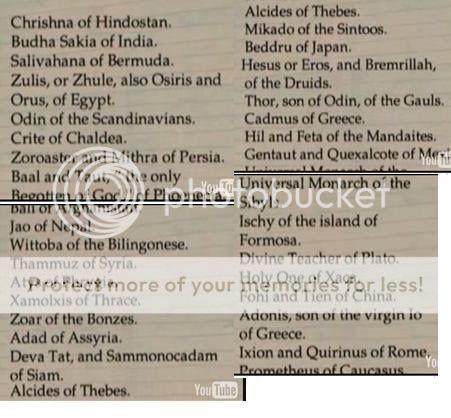
This are lists of all of the religions and cultures that also 'worshipped' (for lack of a better word) the sun, i.e., they observed the night skies and the seasons and crop cycles (not circles, cycles) -- planting, growing, harvesting, winter, spring planting etc.

Many religions predated the Christian mythology of virgin birth, 3 stars or "kings" in the east, performing miracles, resurrectionl etc.

Note Sirius, the "star of the east" lined up with the three stars in the belt of Orion (referred to as the three kings) -- at winter solstice.

The Contellation Virgo is also referred to as "the Virgin" and "the House of Bread" -- Bethlehem translates as "the house of bread."

Note how the sun falls and the days shorten in the winter ... "the death of the long days and of the growing season"

Note the Southern Cross in the sky. On Dec. 22, 23, 24 the sun is lowest on the horizon of all year ... then, on the 25th, it is 'resurrected', i.e. begins to rise in the sky more each day from the horizon and this is the death of winter, so to speak, as weather now heads towards spring.

Spring equinox, the growing season to start.

Jesus is basically the rewrite (or plagarism) of the Egyptian sun god. Note the sun in the middle of the zodiac, replaced by Jesus' head. Note the references to the constellations.

Hello, the light is the sun ... remember, no electricity back then, the sun supplied energy for the crops -- hence, the "sun god".

The crown of thorns is rays of sunshine.
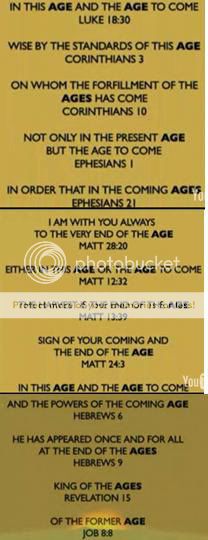
The ages will be astronomically and astrologically explained, soon -- in terms of what an "age" is.

Note explanation: every 2,150 years the sunrise comes up in the next house of the zodiac, i.e. in the next constellation. It takes 25,750 years for the sun to work its way around the zodiac, so to speak. Every 2,150 year period is called, an "age".

Note the age of Moses is Aries the Ram. The age of Jesus is Pisces. We are almost in the age of Aquarius.
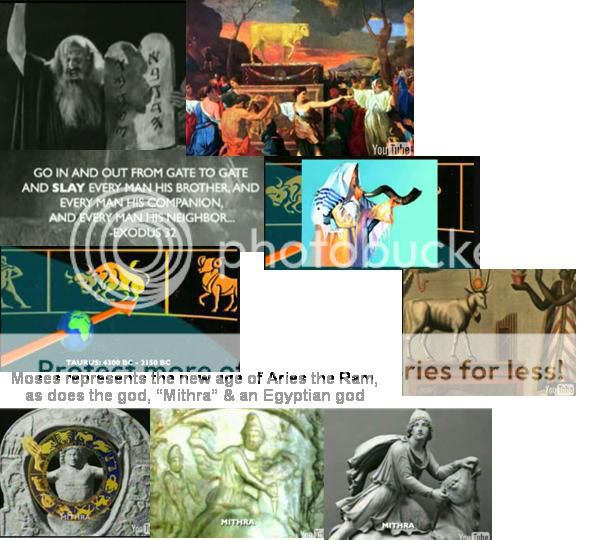
The golden bull was not an idol, that's propaganda, it was a symbol of the astrological and astronomical "age" of Taurus ending, and Aries beginning. Many cultures also observed and "worhipped" so to speak, astronomy in this way, as they felt astronomy is God's mathematics, so to speak, and "divine order in the universe" -- which is of course, is.

Note references to the age of Pieces.
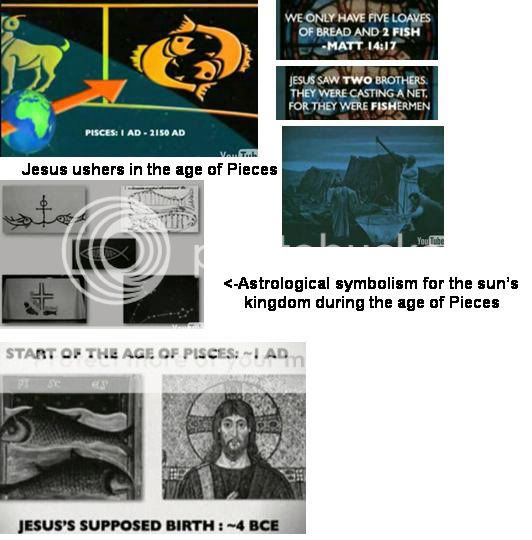
"End of the world propaganda" is really supposed to be describing the end of one age and going into the other. Pretty damn simple, isn't it? No hocus pocus (except of course for the magic of existance in the first place.)

Now all the references to "ages" makes sense.

Virgin birth etc and the whole basic mythology of Christianity is straight copy of Egyptian mythology.

These lists are pairing up how Josephus (apparently Saul or Paul, according to one Egyptologist who we'll look at in the next post) copies Egyptian mythology and morphed it into Christain mythology.
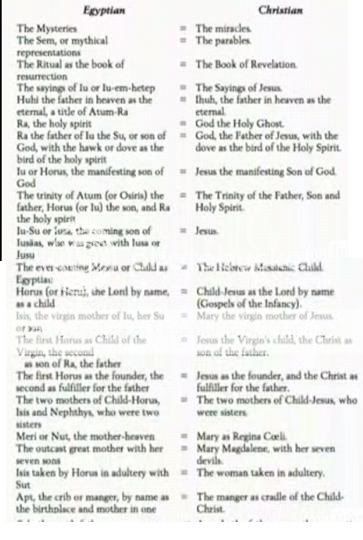
(cont)
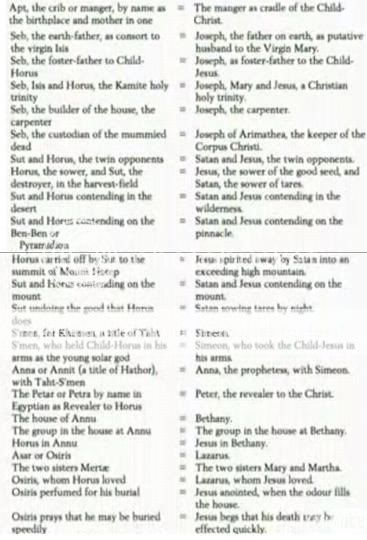
(cont)
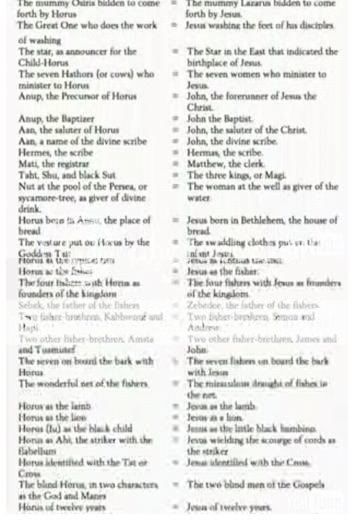
(cont)
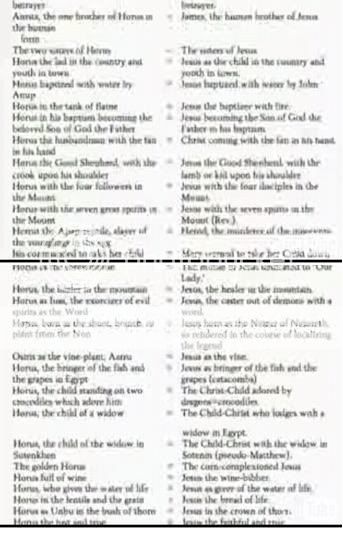
(cont)
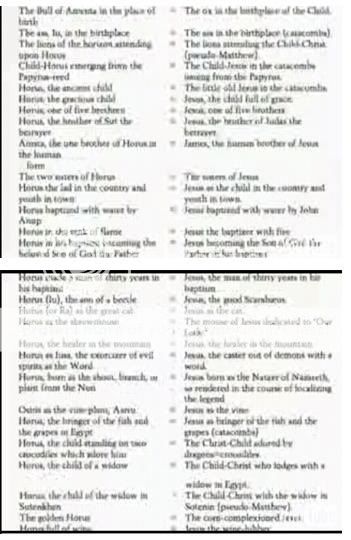
(cont)
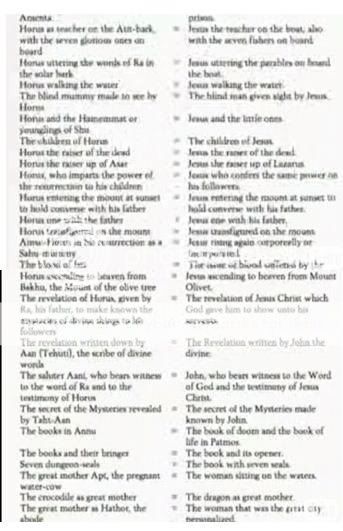
(cont)
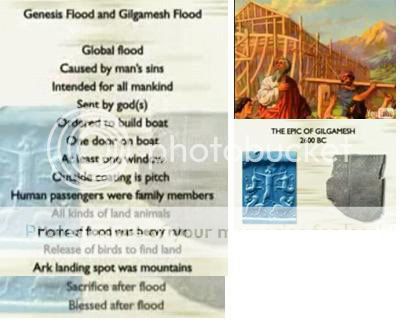
(cont)

(cont)

Self explanatory.

Self -explanatory.

All these landmark events were landmark events in Egypt mythology before they were in Jewish or Christain or Islamic mythology (religion).

Jesus story seems to be a copy of Joseph which is a copy of the Egyptian story of sun appreciators and astronomers and astrologers (same thing, back then) -- all based on the Egyptian sun mythologies.
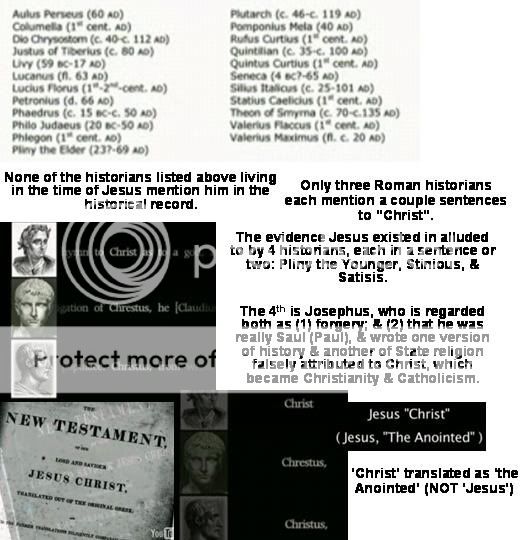
About 30-40 historians don't mention Jesus or Christ or his miracles like walking on water and rising up to heaven never made the news. Only 4 historians mention Christ and don't mention Jesus. Three of them only have 2-3 sentences IN TOTAL about Christ -- which wasn't a name, it means, 'the annointed'.
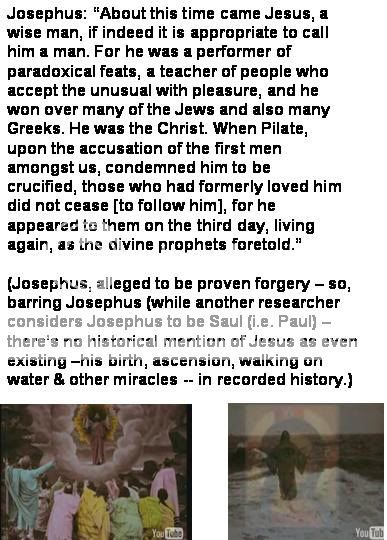
Josephus the fake historian (who in the next post we'll see may have been Saul i.e. Paul and did TWO histories, one for the State and one for his version of religion ... apparently the State version was the history of the pharoahs, which we'll look at in the next post of an Egyptologist's theories that I've been looking at for 3 weeks).

Thomas Paine, I forget who he was.
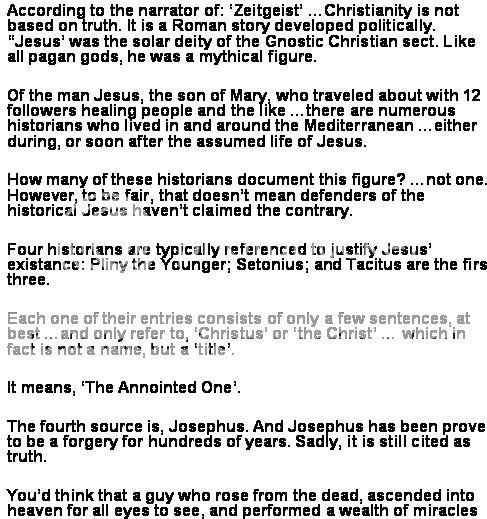
interesting read
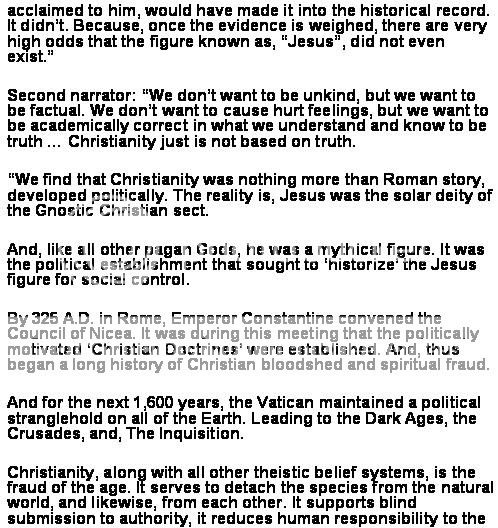
interesting read
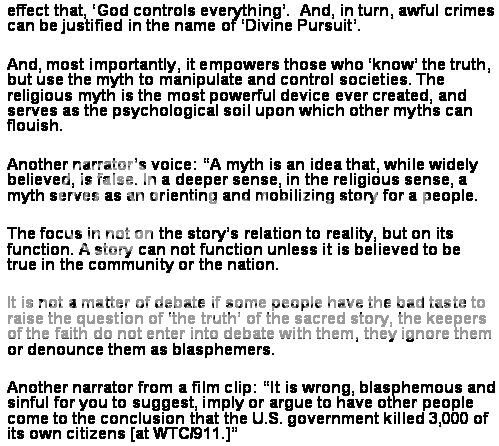
interesting read
Interesting movie.
[edit on 18-8-2008 by counterterrorist]
[edit on 18-8-2008 by counterterrorist]
(hopefully in all the slides below, I got all the captions in the right place, since I did this post in two passes. I'll check them tomorrow morning if I can make updates at that time, I will.)
At the following url, there's a url for the full length movie, as well. You've already seen the WTC/911 part which was about 30 minutes. The religious mythology part is about 40 minutes, (if you have a high-speed connection, the youtube is on the bottom of the page, if not, I've provided slides for you, below) which describes Judaic/Christain/Islamic mythology (theology) based on Egyptian mythology (theology)-- then WTC/911 mythology based on Judaic/Christain/Islamic theology (mythology).
(cont) –‘the relationship between neo-Nazis and WTC/911’ -- at www.abovetopsecret.com...)
Specifically, the process of mythmaking as it applies to WTC/911 and social engineering in general.
The Zeitgeist segment on WTC/911 is located at the above post; however, in addition to looking at mythmaking as a way to control the population regarding WTC/911, the Zeitgeist film says that the reason people are so easily misled into war or where-ever is because – in effect -- they’re already mind-controlled, or socially-engineered and turned away from nature by preconditioning regarding existence, particularly by being conditioned by religion to follow “authority” figures blindly.
So, what I’ve done in order to learn this material and also make it more accessible not only for those without high-speed cable hook-ups, but as a guide …I’ve made slides of a 40-min segment of Zeitgeist dealing with mythmaking as it applies to the formation of Sheeple. (This 40-min segment does NOT duplicate the Zeitgeist segment at the above url.)
So, here are the slides, which was fairly explanatory if you take them as a comic book, and I’ve occasionally put in commentary between them.

This is the cross of the zodiac with the Egyptian sun god, Horus in the middle. It represents the sun orbit of the sun with the constellations of our solar system in relation to the sun's orbit. In Egyptian mythology, Horus is light (day) and Set is dark (night).

This are lists of all of the religions and cultures that also 'worshipped' (for lack of a better word) the sun, i.e., they observed the night skies and the seasons and crop cycles (not circles, cycles) -- planting, growing, harvesting, winter, spring planting etc.

Many religions predated the Christian mythology of virgin birth, 3 stars or "kings" in the east, performing miracles, resurrectionl etc.

Note Sirius, the "star of the east" lined up with the three stars in the belt of Orion (referred to as the three kings) -- at winter solstice.

The Contellation Virgo is also referred to as "the Virgin" and "the House of Bread" -- Bethlehem translates as "the house of bread."

Note how the sun falls and the days shorten in the winter ... "the death of the long days and of the growing season"

Note the Southern Cross in the sky. On Dec. 22, 23, 24 the sun is lowest on the horizon of all year ... then, on the 25th, it is 'resurrected', i.e. begins to rise in the sky more each day from the horizon and this is the death of winter, so to speak, as weather now heads towards spring.

Spring equinox, the growing season to start.

Jesus is basically the rewrite (or plagarism) of the Egyptian sun god. Note the sun in the middle of the zodiac, replaced by Jesus' head. Note the references to the constellations.

Hello, the light is the sun ... remember, no electricity back then, the sun supplied energy for the crops -- hence, the "sun god".

The crown of thorns is rays of sunshine.

The ages will be astronomically and astrologically explained, soon -- in terms of what an "age" is.

Note explanation: every 2,150 years the sunrise comes up in the next house of the zodiac, i.e. in the next constellation. It takes 25,750 years for the sun to work its way around the zodiac, so to speak. Every 2,150 year period is called, an "age".

Note the age of Moses is Aries the Ram. The age of Jesus is Pisces. We are almost in the age of Aquarius.

The golden bull was not an idol, that's propaganda, it was a symbol of the astrological and astronomical "age" of Taurus ending, and Aries beginning. Many cultures also observed and "worhipped" so to speak, astronomy in this way, as they felt astronomy is God's mathematics, so to speak, and "divine order in the universe" -- which is of course, is.

Note references to the age of Pieces.

"End of the world propaganda" is really supposed to be describing the end of one age and going into the other. Pretty damn simple, isn't it? No hocus pocus (except of course for the magic of existance in the first place.)

Now all the references to "ages" makes sense.

Virgin birth etc and the whole basic mythology of Christianity is straight copy of Egyptian mythology.

These lists are pairing up how Josephus (apparently Saul or Paul, according to one Egyptologist who we'll look at in the next post) copies Egyptian mythology and morphed it into Christain mythology.

(cont)

(cont)

(cont)

(cont)

(cont)

(cont)

(cont)

(cont)

Self explanatory.

Self -explanatory.

All these landmark events were landmark events in Egypt mythology before they were in Jewish or Christain or Islamic mythology (religion).

Jesus story seems to be a copy of Joseph which is a copy of the Egyptian story of sun appreciators and astronomers and astrologers (same thing, back then) -- all based on the Egyptian sun mythologies.

About 30-40 historians don't mention Jesus or Christ or his miracles like walking on water and rising up to heaven never made the news. Only 4 historians mention Christ and don't mention Jesus. Three of them only have 2-3 sentences IN TOTAL about Christ -- which wasn't a name, it means, 'the annointed'.

Josephus the fake historian (who in the next post we'll see may have been Saul i.e. Paul and did TWO histories, one for the State and one for his version of religion ... apparently the State version was the history of the pharoahs, which we'll look at in the next post of an Egyptologist's theories that I've been looking at for 3 weeks).

Thomas Paine, I forget who he was.

interesting read

interesting read

interesting read
Interesting movie.
[edit on 18-8-2008 by counterterrorist]
[edit on 18-8-2008 by counterterrorist]
Here's an ongoing thread www.abovetopsecret.com... on ATS apparently based on racist sources that overlap Nazi
and neo-Nazi sheeple mentality -- as the focus is on Jews as "the enemy" -- rather than on the Fed, City of London and Bundesbank.
See my replies:
www.abovetopsecret.com...
and
www.abovetopsecret.com...
and
www.abovetopsecret.com...
What makes a neo-Nazi argument interesting is the mixing of truth and lies.
I've noticed on ATS, although there are only a few overt neo-Nazis, every time one disappears, a more skilled agent provocateur argument appears. (NOTE: I am NOT saying the poster is a neo-Nazi or agent provocateur ... at this time. I simply haven't investigated enough, yet.) in fact, here's a post w/2 videos that are very beautiful www.abovetopsecret.com... adding to the argument that IT IS THE SOURCE quoted that appears racist NOT the poster.
However, the Nazis and Fed and City of London together wanted the oil in this area since the Russian revolution ... and continued working together until Chevron got the Baku oil fields in 1994.
The Georgia conflict is ongoing western capitalism wars over oil rights and actually, no rights at all ...unless you legitimize war booty as a "right".
[edit on 19-8-2008 by counterterrorist]
and, also see www.abovetopsecret.com...
Map of Principle Pipelines to Europe morris108.wordpress.com... (scroll down):
The BTC pipeline is not on this map, or it is an offshoot of lowest Blue pipeline?




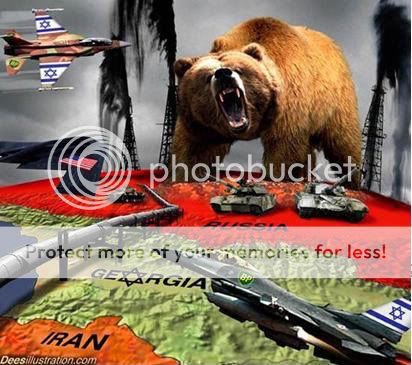
for further discussion from which the following exceprt is taken, see www.abovetopsecret.com...
[edit on 19-8-2008 by counterterrorist]
See my replies:
www.abovetopsecret.com...
and
www.abovetopsecret.com...
and
www.abovetopsecret.com...
What makes a neo-Nazi argument interesting is the mixing of truth and lies.
I've noticed on ATS, although there are only a few overt neo-Nazis, every time one disappears, a more skilled agent provocateur argument appears. (NOTE: I am NOT saying the poster is a neo-Nazi or agent provocateur ... at this time. I simply haven't investigated enough, yet.) in fact, here's a post w/2 videos that are very beautiful www.abovetopsecret.com... adding to the argument that IT IS THE SOURCE quoted that appears racist NOT the poster.
However, the Nazis and Fed and City of London together wanted the oil in this area since the Russian revolution ... and continued working together until Chevron got the Baku oil fields in 1994.
The Georgia conflict is ongoing western capitalism wars over oil rights and actually, no rights at all ...unless you legitimize war booty as a "right".
[edit on 19-8-2008 by counterterrorist]
and, also see www.abovetopsecret.com...
Map of Principle Pipelines to Europe morris108.wordpress.com... (scroll down):
The BTC pipeline is not on this map, or it is an offshoot of lowest Blue pipeline?





for further discussion from which the following exceprt is taken, see www.abovetopsecret.com...
I think it is misleading to refer to the NWO as the ZNWO (Zionist New World Order).
I have spent hundreds of hours studying the O-WO-NWO and do not think the ZNWO is an accurate term.
At the moment I'm studying Egyptian "sun worshippers" as they became "judiasm" as it became "christianity" and "islam" and the Council of Nicea that took Paul's apparent State interpretation or propagandizing of Jesus' & James' work -- and came up with Catholicism and the Dark Ages and Inquistion and Illuminati and Holy Roman Empire Knights of Malta and O and WO and NWO.
I just think that "Zionism" came on the scene so late in the game, that it's totally misleading to re-label the NWO as the ZNWO.
[edit on 19-8-2008 by counterterrorist]
Originally posted by counterterrorist
Originally posted by ADisbeliever
I don't understand what you mean. I'm just sharing sad stories from survivors of the holocaust, to prove the holocaust-deniers wrong.
I don't see how that makes me a neo-nazi.
Will you be banned for having offensive thoughts? ...not my call, the ATS mods are watching you.
Your posts are monitored.
You're being investigated.
If all goes well, you'll be banned AGAIN from ATS for being offensive -- hopefully, this time, permanently.
I'm not a party in this thread, but I observe that your comments are meant to be intimidating and invoke the specter of "Big Brother Watching". Ideologicaly, this is well aligned with Nazis, who you claim to dislike. Oh, irony...
In addition, you misused ATS and its resources to essentilly HOST a whole bunch of materials you grabbed and pasted from a variety of sources, as opposed to running your own web site. In my opinion, this is disservice to ATS community.
[edit on 19-8-2008 by buddhasystem]
Originally posted by buddhasystem
you misused ATS and its resources to essentilly HOST a whole bunch of materials you grabbed and pasted from a variety of sources
Source material is normally referred to as, 'documentation'. I guess verifying my sources with documentation comes from being an investigative reporter and oral journalist and published author reviewed by the NYT as having written one of the best books of the year in 1991, about engineers and firemen and switchmen and conductors on steam engines... and an 'amateur' historian with an avocation of investigating national security and foreign policy.
There are a number of premises in this thread.
What sources are you referring to?
If you describe the source material, I'll tell you why that documentation is included? Fair?
[edit on 19-8-2008 by counterterrorist]
Also see, 'The War In Georgia Is A Big Oil Conspiracy (Cheney and Azerbaijan)' at
www.abovetopsecret.com...
(Also, see maps at --4th map will be explained at end of this oil post series), www.abovetopsecret.com...)
(I've contributed to above post, but info to add about oil histories -- & do not want to 'crowd' the above post since the following info includes other areas in addition to Georgia/Azerbaijan.
...because this info overaps Nazi/neo-Nazi NWO oil/drug/WTC-911 and current U.S. (& Enron) /British/German (Fed/City of London-Bank of England/Bundesbank) (CIA-MI6-BND-al Qaeda-Saudi) interests and operations in the area.
(You'll have to skim the following info for eastern European relevance because I've not cut out the other oil co. info, which is directly or indirectly related behind the scenes. Just be patient and read the whole thing if you want increased understanding.)
(excerpted from my historical novel w/refs):
cont
[edit on 20-8-2008 by counterterrorist]
(Also, see maps at --4th map will be explained at end of this oil post series), www.abovetopsecret.com...)
(I've contributed to above post, but info to add about oil histories -- & do not want to 'crowd' the above post since the following info includes other areas in addition to Georgia/Azerbaijan.
...because this info overaps Nazi/neo-Nazi NWO oil/drug/WTC-911 and current U.S. (& Enron) /British/German (Fed/City of London-Bank of England/Bundesbank) (CIA-MI6-BND-al Qaeda-Saudi) interests and operations in the area.
(You'll have to skim the following info for eastern European relevance because I've not cut out the other oil co. info, which is directly or indirectly related behind the scenes. Just be patient and read the whole thing if you want increased understanding.)
(excerpted from my historical novel w/refs):
From: ‘Oil Wars’, by Mary Kaldor, Terry Karl, & Yahia Said
“In the early part of the twentieth century, there was fierce rivalry between the three largest oil companies …Shell, Exxon ...and, British Petroleum.
“Shell … Henri Deterding, head of Shell, bought (1) oilfields in Egypt in 1908,in 1910, (3) Mexican oilfields belonging to Lord Cowdray Weetman Pearson, (4) Venezuelan oilfields, which still produce a sixth of Shell’s supplies, (5) American oilfields
(2) the Russian Ural-Caspian oilfields
“Exxon … Walter Teagle, head of Exxon (1) secretly bought a prosperous Texas oil company named Humble in 1919, (2) secretly bought out Nobel Russian oil interests for 11.5 million dollars in 1920, though the new communist regime seized the oilfields and paid Exxon nothing. [Also note, Nazi Schmitz of I.G. Farben owned just as many shares as Rockefellor(s) in Standard Oil.]
“British Petroleum … BP controlled not only Iran (Anglo-Persian Oil Company), but 25% of oil from Iraq Petroleum Company. Iraq Petroleum Company (earlier called, Turkish Petroleum Company) was formed following WWI, composed of British Petroleum, Exxon, Gulf, Texaco, Mobil, and Calouste Gulbenkian, an Armenian entrepreneur.
“Exxon, Shell & British Petroleum … In 1928, Teagle (Exxon), Deterding (Shell), and Sir John Cadman (BP) met in Achnacarry Castle in Scotland. They agreed on a price-fixing scheme that would stop competition that had been harmful to them. These three oil rulers controlled the pricing and supply of oil worldwide.
“However, a huge new oilfield first drilled in Kilgore, Texas, released a gush of oil, resulting in the price of crude falling to ten cents a barrel. H.L. Hunt bought out the original Kilgore wildcat driller, ‘Dad Joiner’. Hunt became a billionaire, richest of all Texans. But, the problem of oversupply was so devastating that governors of Texas and Oklahoma called in the national guard and closed down the oilfields, enforcing a system of rationing by which the demand in a particular month was shared among oil producers by a state body called Texas Railroad Commission.
“Exxon … In 1926, Exxon signed an agreement with the German chemical combine, I.G. Farben, for an exchange of patents and research. Farben was to stay out of the oil business and Exxon would stay out of the chemical business. The agreement gave Nazi Germany hundred-octane aviation fuel and synthetic rubber. Exxon held back the research in synthetic rubber in the U.S. In 1941, Justice Department bought two antitrust suits against Exxon for conspiring to control oil transportation through pipelines and making restrictive agreements with I.G. Farben.
Exxon was forced to pay a fine of $50,000. The U.S. was now involved in the WWII and Japan had seized the Malayan rubber plantations, from which America had earlier derived rubber. Senator Harry Truman claimed that Exxon’s failure to pursue synthetic rubber research in the U.S., while developing it in collaboration with the Germans, constituted treason.
“Texaco … under direction of its president, Torkild Rieber, Texaco provided six million dollars worth of oil to Franco, the Spanish dictator. Rieber made contact through Spain with leading Nazis and agreed to supply oil from Colombia to Germany. Texaco continued to supply oil to Nazi Germany even after the outbreak of the World War II in 1939, receiving as payment three Hamburg tankers. Rieber sealed the deal with Goering in Berlin.
At Goering’s insistence, Rieber put forward a peace plan to Franklin D. Roosevelt which would ensure Britain’s surrender. Roosevelt told Rieber to get out of his dealings with Nazi Germany. Rieber ignored Roosevelt and financed the propaganda mission of Dr. Gerhardt Westrick, a German lawyer, to dissuade American businessmen from supplying Britain with arms. The head of British Intelligence in New York, Canadian millionaire William Stephenson, learned of the Westrick fiasco and broke the story to New York Herald Tribune. Westrick was forced to return to Germany on a Japanese ship. Rieber was discredited and Texaco shares plummeted.
“Shell … Mexican oil was essentially controlled by a Britisher, Weetman Pearson, later titled Lord Cowdray.
He began in 1901 to buy oil concessions in Mexico and by 1918 was one of the richest men in the world … the British equivalent to the American, Rockefeller. Pearson’s fortune laid the foundation for Lazard Bank, the Financial Times, Economist, Longmans and Penguin Books. In 1919, Cowdray sold out the majority of his company to Deterding of Shell. In 1938, Mexican President Lazaro Cardenas nationalized the seventeen foreign-owned oil companies into one and a monument to the nationalized company, PEMEX, was erected in Mexico City.
“American, Dutch, and British oil companies boycotted nationalized Mexican oil interests, and PEMEX was eventually forced to pay 130 million dollars in compensation for seizing the companies. During WWII, the big oil companies drained off Mexico’s oil reserves, then switched their attention to Venezuela where they were in league with Gomez, the dictator.
“Socal, Texaco & Aramco … Meanwhile, in the Middle-East, in 1926, King Ibn Saud, Muslim desert warrior, had conquered rivals in Mecca and the Hejaz and named the whole territory, from the Persian Gulf to the Red Sea, Saudi Arabia. One of King Saud’s principal advisors was Harry St. John Philby, the Arabist who quit British Colonial Service out of disaffection. Philby became a Muslim and was close to Saud.
King Saud needed money to finance his enterprises and Philby suggested he exploit his land’s oil resources. Philby assisted Socal in getting the concession in 1933. King Saud received an immediate loan of 30,000 pounds, with another 20,000 pounds eighteen months later, and an annual rent of 5,000 pounds, all in gold. Socal paid Philby a salary of 100,000 pounds a year. Socal, short of capital and market outlets, sold half its Saudi and Bahrain concession to Texaco’s Cap Rieber. The joint venture was called Aramco.
May 1939, King Saud turned the valve on the pipeline and oil began to flow. Saud was so delighted with the money and gifts he received from Socal and Texaco he increased the size of the concession to 444,000 square miles, a plot the size of Texas, Louisiana, Oklahoma, and New Mexico combined.
… Kuwait, one of many small independent sheikhdoms which had cut into the land mass of Saudi Arabia, had also discovered oil and the concession was purchased by Gulf in 1927 for $50,000. In 1934, Gulf and BP signed an agreement with the Kuwaiti sheikh in a joint venture and huge reserves were discovered in 1938.
“Gulf & British Petroleum
“Aramco … During WWII, Britain advanced about 20 million dollars to King Saud to bribe him to renege on the Socal/Texaco concession and go with BP. Socal and Texaco appealed to Washington … Roosevelt sent lend-lease money to Saudi Arabia.
Roosevelt and his advisors decided U.S. should have controlling interest in Aramco, to protect the nation’s oil interests. In 1943, Roosevelt authorized formation of a new corporation to acquire 100% of Aramco. Harold Ickes, Petroleum Administrator for War and Secretary of the Interior, was president of the new corporation, the secretaries of State, War, and the Navy were among the directors and Abe Fortas was secretary.
Aramco would not immediately agree to sell its concession to the new federal corporation, so Ickes said the corporation would build a thousand-mile pipeline to carry Saudi Arabian oil to the Mediterranean. In return, Aramco would guarantee 20% of their oilfields as a naval reserve which would be available to the navy at a cut rate.
In the end, after much political bickering in the U.S. and internationally, Texaco and Socal built the pipeline themselves, creating Trans-Arabian Pipeline Co, Tapline. It was not until 1949 that Syria and Lebanon agreed to let the pipeline be built, at a cost of $200 million. Over the years, the pipeline was a target for guerrillas, a focus for boycotts, and a bargaining chip for Syria against America. In 1975, it was shut down.
However, Truman became U.S. President two months later and gave full support to the establishment state of Israel. Socal and Texaco worried about the political climate in Saudi Arabia. They decided to bring two other American oil companies into Aramco, Exxon for 30% and Mobil for 10%.
In 1945, Franklin Roosevelt promised King Saud the U.S. would not change its policy regarding Palestine and a Jewish state, without consulting the Arabs.
“King Saud continued to demand more money and finally, in 1950, the U.S. State Department and Aramco agreed on a scheme whereby the money Aramco gave King Saud would be deducted from the company’s tax bill, depriving the U.S. Treasury of 50 million dollars or more in taxes each year.
cont
[edit on 20-8-2008 by counterterrorist]
(cont from previous post)
from same sources:
cont
from same sources:
“Under U.S. tax laws establishing double taxation, oil companies would not be taxed inside the U.S. All major oil companies adopted the same tax dodge ...so, by 1973 the five largest companies were making two-thirds of their profits abroad and paying no U.S. taxes on those earnings.
“This arrangement allowed oil companies to pay lower U.S. taxes than any group of industries. The U.S. had essentially turned into a country operated for the profit of the oil rulers.
“British Petroleum …. Reza Shah seized power in Iran in 1921 and soon took on the trappings of the Persian Peacock Throne. In 1941, when Hitler invaded Russia, the Shah refused to expel his Nazi allies, so the British and Russian armies invaded Iran to ensure oil and supply routes. The Shah was exiled to South Africa, where he died. During the war, Britain and Russia ruled, but at the end of WWII the old Shah’s 21-year-old son was placed in power. Iran, like most oil-producing countries, resented the power foreign-owned oil companies wielded over it.
A shrewd older politician, Dr. Mossadeq, was appointed chairman of a committee on Iranian oil policy. By 1951, Mossadeq was calling for nationalization …when he was elected prime minister by the Iranian parliament, Iran immediately seized BP’s oilfields.
When a Panamanian ship, the Rose Mary, took on oil from Abadan, Royal Air Force RAF planes forced it into Aden harbor where its cargo was impounded. American oil companies joined the BP boycott of Iran. However, President Truman and Secretary of State Dean Acheson were appalled by the imperialism of Britain, and when Mossadeq came to America to plead his case to the UN Security Council, Acheson befriended him.
Iran was placed under international boycott by BP.
“However, antitrust fever had again overtaken the U.S. In 1952, the Senate Select Committee on Small Business released a report titled, The International Petroleum Cartel. The report showed the seven largest oil companies, nicknamed, ‘Seven Sisters’, controlled the majority of oil-producing areas outside the U.S., all foreign refineries, divided world markets between them, shared pipelines and tankers between themselves, and fixed oil prices worldwide.
“Eisenhower became President … John Foster Dulles was appointed Secretary of State, with the result the oil cartel was forgotten and the new foreign policy mythology became anti-communism.
“In 1953, CIA with British support began subversive action against Mossadeq. Mossadeq had taken control of the Iranian army. The Shah tried to oust him, failed, and was forced to flee. The CIA coup, led by CIA’s Kermit Roosevelt spending about $700,000, forced Mossadeq out of office …and the Shah returned to Teheran triumphant. British and American oil companies formed an international consortium to buy and develop Iranian oil.
BP received 40% of the shares of the consortium, the five American sisters each got 8%, Shell received 14%, and CFP (Compaignie Francaise de Petrole) 6%. The oil cartel members congratulated themselves that they had shown the world that no puny nation, such as Iran or Mexico, could seize their assets and flourish.
“OPEC … In 1961 the Organization of Petroleum Exporting Countries was established with members being Iran, Iraq, Kuwait, Saudi Arabia and Venezuela. Since then, the following countries joined OPEC … Qatar in 1961, Indonesia and Libya in 1962, Abu Dhabi in 1967, United Arab Emirates in 1974, Algeria in 1969, Nigeria in 1971, Ecuador in 1973, and Gabon in 1975. Their headquarters, originally located in Geneva, moved to Vienna in 1965. Policy is determined by delegates from members countries, which meet at least twice a year.
“From the beginning of the oil energy monopoly there have been other sources of energy more abundant, more environment-friendly, and cheaper. Steam-driven vehicles proved efficient, but they were driven out by gasoline-driven vehicles. Since railway engines require less fuel than automobiles and trucks, they were allowed to fall into disrepair, the decrepit U.S. railway infrastructure now produces frequent calamities.
“World oil prices are currently high because OPEC and American and British oil companies manipulate prices to gain highest profits possible. It costs about one dollar per barrel to pump oil from the ground, but the present price is $26.41 per barrel. If market demand for oil products were allowed to operate independently, gas prices at the pump could drop 50% at least.
“In 1973, OPEC raised oil prices by 70% as a political warfare tactic aimed against western nations supporting Israel in the Yom Kippur War of Oct. 1973. That same year in December prices were hiked another 130% and a temporary embargo was placed on oil shipments to the U.S. and Netherlands.
By early 1980s, OPEC’s influence began to wane as Western oil corporations discovered new sources of oil and began to use political and subversive pressure to force OPEC to cut back production and keep prices artificially high. OPEC’s power has been decimated by internal conflicts, and by the Iran-Iraq war that broke out in 1980. Within the last several months, the U.S. has again warned OPEC about raising prices by threatening to open up our national strategic oil reserves. The U.S. and British oil corporations insist on being the only ones to manipulate the price of oil.
“Gulf War I … The Gulf War was perpetrated by British and U.S. major oil shareholders to (1) warn Japan and European countries, especially Germany, that the U.S. controls the world’s oil supply …by armed force if necessary, (2) to control Iraq’s oil production through embargo resulting from the war, and (3) to conquer Iraq since it threatens Israel’s military hegemony in the Middle-East.
“Even though Iraq is under an embargo, it’s estimated Iraq ships about 100,000 barrels of illicit oil in excess of the U.N.-approved export quota per day. At the end of the war against Serbia in Bosnia and Kosovo, an embargo was slapped on Serbia. However, recently Serbia has been receiving black market oil from Russia. That’s why U.S. Navy SEALs boarded a Russian ship in the Gulf of Oman, to warn Russians not to continue selling oil to Serbia.
“The world oil cartel continues to fix gasoline prices worldwide. Prices in California have skyrocketed. During a past year, world crude oil prices have increased by approximately 340%. The April 1999 decision by OPEC to cut production quotas contributes to the hyperinflation of oil prices, but is only part of the problem. OPEC now produces about 40% of the world’s oil supply.
“The real cause of the current rise in price for oil is that speculators are now moving into what are called hard commodities … energy, base metals and food. Mar. 8, 2000, Iranian Oil Minister Bijan Namdar Zanganeh, pointed out in a speech on Iran State TV that speculation, rather than physical shortages in crude oil, lay behind the current surge in oil prices.
This series deals with plutocracy, the rule of a nation by those with wealth. Plutocrats deal in all sectors of the economy, oil as well as all others. Currently these plutocratic speculators are making billions of dollars through Wall Street scams like artificially inflated beyond real value of the companies’ initial public offerings, IPOs.
“Along with hyperinflationary speculation in the markets, oil corporations continue to buy politicians, resulting in oil-based rulers dominating every nation in the world.
“The Rockefeller Monopoly … John D. Rockefeller’s father, called ‘Doctor’ Rockefeller, was a bogus physician who sold patent medicines. Beginning in Cleveland, Ohio as a bookkeeper, he then went into partnership in a refinery with the Clark brothers and soon bought them out.
Anthony Sampson’s Seven Sisters comments.
“He expanded with great daring. Borrowing wherever he could, and bringing in new partners. He realized the only way to dominate the industry was not by producing oil, but by refining and distributing it, and undercutting rivals by cheaper transport. With help of a new partner, Henry Flagler, he persuaded railroads to give secret rebates to his oil, extending the existing practice of allowing discounts for large quantities of freight.
“When John D. secretly bought out rival oil companies, the executives pretended to be Rockefeller competitors, and reported what rival company executives told them. By 1870, he established a joint-stock company, called Standard Oil Co., with a capital of a million dollars of 10% of the oil in America. The oil industry has always been plagued with overproduction. The year after oil was discovered, for example, the price of a barrel was $20. At the end of the next year the price had dropped to 10 cents a barrel, because of overproduction. In the 1870s, two groups vied for control of the oil industry, (1) the producers and drillers, and (2) the refiners. By 1875, Rockefeller, as president of the refiners’ Central Association was leader of the refiners. The refiners effectively took control from the producers and drillers. John D. formed Standard Oil Trust in 1883, trading across the entire continent.
Seven Sisters continues.
“Through the device of a trust, which held shares in each component company, Rockefeller was able to circumvent laws which prohibited a company in one state from owning shares in another …at the same time, he could pretend all his companies were independent. ‘This movement was the origin of the whole system of modern economic administration. It has revolutionized the way of doing business all over the world. The time was ripe for it. It had to come, although all we saw at the moment was to save ourselves from wasteful conditions. The day of combination is here to stay. Individualism has gone, never to return,’ Rockefeller said.”
cont
(cont from previous post)
same sources

Note: I'm not so sure I completely agree with use of the word, 'genocide' in the last quoted passage -- but, if you consider clearing the land an act of genocide -- it depends in interpretation & documentation if this is done through killing or not ... and/or if removing one from one's home is genocidal, or just sociopathic. In other words, I'd need to research it more thoroughly to label it 'genocide'. Though, I think 'sociopathic' would fit. (The cartoon (from another post), takes on greater clarity in relation to the oil history posts on this page.
cont at www.abovetopsecret.com...
[edit on 20-8-2008 by counterterrorist]
[edit on 20-8-2008 by counterterrorist]
same sources
Oil Wars continues.
From the center of his web at 26 Broadway, New York City, Rockefeller bought oilfields as well as refineries as the industry moved from Pennsylvania, to Ohio, to Kansas, and on to California. Standard Oil’s income was larger than most states and it ‘bought’ federal and state politicians to enhance its position.
With its huge profits, Standard could finance its own expansion.the Far East and Europe. By 1885, 70% of Standard’s business was overseas. Standard now had its own network of agents throughout the world, its own intelligence service which provided information about its competitors and about political leaders in all the target market countries.
Standard Oil was exporting oil to the Middle East,
The ruthlessness of Rockefeller’s tactics against competitors and his own workers, when they dared to demand a living wage, became the focus for a number of muckrakers such as Henry Demarist Lloyd and Ida Tarbell. Tarbell’s, History of Standard Oil, aroused the public against the monopolistic excesses of Rockefeller. Sherman Anti-Trust Act was passed in 1890, buy only brought to bear during Theodore Roosevelt’s presidency.
“In 1907, a report was published by the Commissioner of Corporations, and special prosecutor Frank Kellogg began to detail evidence of Standard’s monopoly and exorbitant profits, nearly a billion dollars in a quarter-century. The case was appealed to the Supreme Court, which in 1911 ruled Standard Oil must divest itself of subsidiaries.
The total value of the assets of all living descendants of John D. Rockefeller was estimated in 1974 at 2 billion dollars …about 2 trillion dollars in today’s money. Standard Oil progeny included (1) Standard Oil of New Jersey …EXXON, (2) Standard Oil Company of New York …MOBIL, (3) Standard Oil of California …SOCAL, (4) GULF Oil Company, (5) Texas Company …TEXACO.
“The Rockefellers, under leadership of David, continued to control American politics through organizations like Council on Foreign Relations and Trilateral Commission.”
Siegfried E. Tischler’s Blood, Toil & Oil, from Nexus Magazine, Vol 11, Number 4, Jun-Jul 2004, comments.
www.nexusmagazine.com/articles/OilDrugsTerrorism.html
John D. Rockefeller was born in Richford, New York, July 8, 1839 (d. 1937) and educated in the public schools of Cleveland, Ohio. He became a bookkeeper in Cleveland at sixteen. In 1862, he went into business with entrepreneur Henry Flagler and Samuel Andrews, the inventor of an inexpensive process for ‘refining’ of crude petroleum. In 1870, their company was renamed, Standard Oil Co. of Ohio.
In 1872, J. D. Rockefeller founded South Improvement Co., which by 1887 amalgamated all but a few per cent of America’s refining capacity in one hand and became a corporate giant of such vast might that it was, in effect, ‘running’ America.
The USA was fighting another brutal War of Independence … this time from Standard Oil, which it won in 1911 when the Rockefeller monopoly was dismantled. Just as in the case of the other War of Independence, victory was an elusive concept. The rest of the 20th century has been called by many ‘Rockefeller’s revenge’. To all intent and purposes, this re-established the dominance of the oil industry over American politics and the American people. What has changed is that not only have the American people been pushed around the chessboard, but most of mankind has been made into pawns in the game of ‘Big Oil’.
In 1823, U.S. President Monroe declared the Americas ‘off-limits’ to any other polity, and the world was divided into the ‘Western hemisphere’ and the rest. John Davison Rockefeller, son of a Rabbi-cum-haberdasher and purveyor of comforts to the men in the Pennsylvanian oil fields, focused his attention on the downstream side of the oil industry and by the late 1880s established an almost total monopoly on transport and refining of crude oil.
“Henry Deterding, an enterprising young Dutchman, was a clerk in a bank in Batavia Jakarta at the turn of the century when the Duri oil field in Sumatra was discovered. A fast learner, he became involved in the company holding the lease over this oil field and by 1902 had risen to president of this company. Deterding was determined to seek domination over the oil industry via the ownership of concessions.
The sideshow developed in the northern foothills of the Caucasus mountains.
Ludwig Nobel, brother of the inventor of dynamite, Alfred Nobel was sent by his father, who was an arms manufacturer supplying the Imperial Russian Army with guns into the Caucasus region, to secure a supply of walnut wood to be turned into gun stocks.
Instead, he came back with ownership of the oil concessions on what is now known as the Baku region of Azerbaijan.
*****“The House of Rothschild financed (1) the Rockefeller oil empire in America, (2) the emerging alliance soon to be named Royal Dutch Shell of the Dutch and English royal houses to take control over the oilfields in the Far East, and (3) the Russian oilfield operations controlled by the Nobel family.*****
“After oil was discovered in the Persian Gulf region and the British secured control of it, the Nobel family was forced by a ‘no holds barred’ price war between Rockefeller and Deterding to sell out. In order to win this fight, Deterding teamed up with Lord Samuels of London, who had established the oil shipping industry..
Josef Stalin spent his early political life as organizer of the Oil Workers Union in and around Baku. The Russian Revolution kept Russian oil off the world market for quite some time.
In the early 20th century, the British Empire began to fray around the edges, and First Lord of Admiralty Captain Fisher, later a lord, argued for re-fitting the Royal Navy with oil-powered engines to give these ships speed advantage over coal-powered steamships. With the closest oil supply being in Persian Gulf, British meddling in Middle Eastern affairs became understandable. This sounded the death knell for the Ottoman Empire, which was in control of this region until the end of World War I.
“That all oil supplies for the German Empire came from the Mosul field in present-day Iraq explains fighting in the Dardanelles Gallipoli during World War I. The German oil supplies had to be disrupted.
“When you look at the geography of the region and follow the railroad line from Mosul to Berlin, you’ll notice that, with exception of a stretch of less than 100 kilometers, this line ran entirely in Entente territory.
“The little piece of land missing was Serbia. The assassination of the Austrian Crown Prince, Archduke Franz Ferdinand on June 28, 1914 in Sarajevo, the capital of Serbia, takes on an entirely different flavor.
“The rest is bloody history, as Kronberger’s, Blood for Oil, comments. After World War I, the domestic oil industry in America swamped the country with cheap oil. After the discovery of oil in Venezuela, the Smoot–Hartley Act enacted by the American Congress was designed to keep oil from Venezuela from destroying the price of this abundant commodity.
However, what it did in effect was it exported American recession globally. One of the remarkable results of World War II was that the American oil industry got involved in the exploitation of the Persian Gulf region.
“From that time on, the Middle East was racked with one war after the other that sent the oil price spiraling skywards.
“At the end of the 20th century, the American war machine had become so awesome that in the absence of a credible opponent a ‘replacement monster’ had to be found.
This is where the perpetual sideshow of 20th century history comes in, the systematic terrorism with which Israel perpetrates genocide among Palestinian owners of the land promised, but not given to World Jewry, by the British Empire … causing symptomatic terrorism.
The entire situation, caused by the Balfour Declaration, is unsolvable by peaceful means, as no amount of goodwill from either side will ever overcome the need for instability in the region to justify inflated oil prices and provide use for over 50% of industrial production, which is arms related.
This is where terrorism, yet again, rears its head. Alexandre de Tocqueville described régime de la terreur as a methodology to make the masses familiar with the realities created by elites.

Note: I'm not so sure I completely agree with use of the word, 'genocide' in the last quoted passage -- but, if you consider clearing the land an act of genocide -- it depends in interpretation & documentation if this is done through killing or not ... and/or if removing one from one's home is genocidal, or just sociopathic. In other words, I'd need to research it more thoroughly to label it 'genocide'. Though, I think 'sociopathic' would fit. (The cartoon (from another post), takes on greater clarity in relation to the oil history posts on this page.
cont at www.abovetopsecret.com...
[edit on 20-8-2008 by counterterrorist]
[edit on 20-8-2008 by counterterrorist]
Originally posted by counterterrorist
Originally posted by buddhasystem
you misused ATS and its resources to essentilly HOST a whole bunch of materials you grabbed and pasted from a variety of sources
Source material is normally referred to as, 'documentation'.
You haven't spent too much time on ATS or you would have noticed that very large posts and quotes are discouraged by the Admins (who are still nice about it) because it's a drain on ATS resource. You could have posted an assembly of links or created a website of your own, on that subject.
I'm not going to argue with you on the topic of the OP, because I currently don't have time to re-do the research I did a couple of years ago (lost the links). In short, my findings were that while the atrocities were real, the numbers were inflated.
(cont from previous page)
same sources
same sources
Appendix 4 ~ A Barrel of Oil Costs One Dollar to Pump from the Ground
Hoover’s online comments. www.hoovers.com
In 1870, Marcus Samuel inherited an interest in his father’s London trading company, which imported seashells from the Far East. He expanded the business and after securing a contract for Russian oil, began selling kerosene in the Far East. [Ed’s note, Dutch, British, and American shippers were engaged in shipping opium to China.]
Standard Oil underpriced competitors to defend its Asian markets. In 1892, Samuel unveiled the first of a fleet of tankers. Rejecting Standard’s acquisition overtures, Samuel created ‘Shell’ Transport and Trading in 1897.
Dutchman Aeilko Zijlker struck oil in Sumatra and formed Royal Dutch Petroleum in 1890 to exploit the oil field. Young Henri Deterding joined the firm in 1896 and established a sales force in the Far East. Deterding became head of Royal Dutch Petroleum in 1900 amidst the battle for the Asian market. In 1903, Deterding, Samuel, and the Rothschilds created Asiatic Petroleum, a marketing alliance. With Shell’s non-Asian business eroding, Deterding engineered a merger between Royal Dutch and Shell in 1907. Royal Dutch shareholders got 60% control, ‘Shell’ Transport & Trading, 40%.
After the 1911 Standard Oil breakup, Deterding entered the U.S. building refineries and buying producers. Shell products were available in every state by 1929. Royal Dutch/Shell joined the 1928 ‘As Is’ cartel that fixed prices for two decades.
Post-WWII Royal Dutch/Shell profited from worldwide growth in oil consumption. It acquired 100% of Shell Oil, its U.S. arm, in 1985 but shareholders sued, maintaining Shell Oil’s assets had been undervalued, and were awarded 110 million dollars, in 1990. After the 1990-1991 Persian Gulf crisis, Shell sold a major California refinery to Unocal and its U.S. coal mining unit to Zeigler Coal.
Management’s slow response to two 1995 controversies … environmentalist outrage over the planned sinking of an oil platform, and human rights activists’ criticism of Royal Dutch/Shell’s role in Nigeria … spurred a major shakeup. Royal Dutch/Shell began moving away from its decentralized structure and adopted a new policy of ‘corporate openness’.
In 1996 Royal Dutch/Shell and Exxon formed a worldwide petroleum additives venture.
Shell Oil joined Texaco in 1998 to form Equilon Enterprises, combining U.S. refining and marketing operations in the West and Midwest.
Similarly, Shell Oil, Texaco, and Saudi Arabia’s Aramco combined downstream operations on the U.S. East and Gulf coasts, as Motiva Enterprises.
In 1999 Royal Dutch/Shell and UK’s BG plc acquired a controlling stake in Comgas, a unit of Compania Energética de São Paulo and the largest natural gas distributor in Brazil, for about 1 billion dollars.
In 2000, the company sold its coal business to UK-based mining giant, Anglo American, for more than 850 million dollars.
To gain a foothold in the U.S. power marketing scene, Royal Dutch/Shell formed a joint venture with construction giant Bechtel, called InterGen.
The next year the company agreed to combine its German refining and marketing operations with those of RWE-DEA. Royal Dutch/Shell tried to expand its U.S. natural gas reserves in 2001 by making a 2 billion dollar hostile bid for Barrett Resources, but the effort was withdrawn after Barrett agreed to be acquired by Williams for 2.5 billion dollars.
In 2002, in connection with Chevron’s acquisition of Texaco, Royal Dutch/Shell acquired Chevron Texaco’s (now Chevron) stakes in the underperforming U.S. marketing joint ventures Equilon and Motiva.
That year, the company, through its U.S. Shell Oil unit, acquired Pennzoil-Quaker State for 1.8 billion dollars. Also that year, Royal Dutch/Shell acquired Enterprise Oil for 5 billion dollars, plus debt. In addition, it purchased RWE’s 50% stake in German refining and marketing joint venture Shell & DEA Oil, for 1.35 billion dollars.
, signaling its return to that country after a more than decade-long absence. Plans to build a 7-billion-dollar liquid natural gas plant in Qatar were announced in early 2005.
In 2004 the Group signed a 200 million dollar exploration deal with Libya
In the same year, the company’s Shell Chemicals subsidiary announced plans to sell its 50% stake in Basell, one of the world’s largest polyolefin makers. The company became part of Royal Dutch Shell after the merger, Royal Dutch Petroleum and ‘Shell’ Transport & Trading Company.
-----
Other accounts of Marcus Samuel are similar.
Right Honorable Marcus Samuel, 1st Viscount Bearsted, Nov 5 1853-Jan 17 1927, was founder of Shell Transport and Trading Company, a precursor to Royal Dutch Shell. His father, also named Marcus Samuel, ran a successful import-export business to the Far East, which Marcus carried on with his brother, Sam Samuel. Marcus Samuel realized the potential of the oil trade during a trip to the Black Sea in 1890, and ordered the construction of eight dedicated tankers, the first of which was Murex. His were the first ships to satisfy the Suez Canal company of their safety, allowing him to ship his product to Bangkok and Singapore. In 1907, Samuel’s company combined with Royal Dutch company of the Netherlands to create the company today known as Shell. The family’s other firm, M. Samuel & Co., merged in 1965 with Philip Hill, Higginson, Erlangers Ltd. to create Hill Samuel, now a part of Lloyds TSB.
[editor's note: this refers to being mayor of the independent sovereign state of "the Crown" aka "the City of London" bankers that founded the Bank of England and the Fed, both dominated by German banking families.]
Samuel was Lord Mayor of London from 1902-1903.
In honor of Shell’s contribution to the British cause in World War I, he was created 1st Baron Bearsted in 1921, and in 1925 became 1st Viscount Bearsted. His son, Walter Horace Samuel, succeeded him both as Viscount and as Chairman of Shell Transport & Trading Company.
Daniel Yergin’s, The Prize, comments.
By the end of the 1880s, Marcus Samuel had already gained some prominence in the City of London. It was no mean achievement for a Jew … and a Jew not from the old Sephardic families, but from the East End of London, a descendant of immigrants who had come to Britain in 1750 from Holland and Bavaria.
Samuel had the same name as his father, Marcus Samuel. The elder Marcus Samuel began his own business career trading on the East London docks, buying curios from returning sailors. In the census of 1851, he was listed as a ‘shell merchant’. Among his most popular products were the little knick-knack boxes covered with seashells, known as a ‘Gift from Brighton’, which were sold to girls and young ladies at English seaside resorts in the mid-Victorian years. By 1860s, the elder Marcus accumulated wealth in addition to seashells, and was importing everything from ostrich feathers and partridge canes to bags of pepper and slabs of tin. He was also exporting an expanding list of manufacturers’ products, including the first mechanical looms sent to Japan.
In addition, in what was to prove of great importance to his son, the elder Samuel had built up a network of trusted relationships with some of the great British trading houses … run mainly by expatriate Scots …in Calcutta, Singapore, Bangkok, Manila, Hong Kong, and other parts of the Far East.
www.hermes-press.com... comments.
Plutocracy is that form of government in which, instead of the people being represented by their elected officials, those with wealth ‘buy’ the officials. Those officials then create laws and policies which produce obscene profits for the wealthy owners of corporations.
Beginning in the nineteenth century with the Rockefeller monopoly, persons of wealth and political power decided that the energy of choice for the world would be oil not coal … just as the drugs of choice would be alcohol, tobacco, [Ed’s note, plus sugar, tea, opium and coc aine.] They set out to control the world’s oil reserves.
for 480,000 square miles …nearly twice the size of Texas, in exchange for twenty thousand pounds in cash, twenty thousand one pound shares, and 16% of the net profits. After three years of drilling and finding no oil, D’Arcy convinced Burma Oil Co. to put up the extra capital needed to keep D’Arcy's venture afloat. After another two years of drilling, they finally struck oil ...and, Burma Oil and D’Arcy formed the new Anglo-Persian Oil Co.
British Petroleum (earlier Anglo-Persian then Anglo-Iranian Oil Company) was started by William Knox D'Arcy in 1901 when he bought a concession from the Grand Vizier in Teheran
In 1914, three months before WWI, the British government through the insistence of Winston Churchill, First Lord of the Admiralty, bought 51% of Anglo-Persian for two million pounds, stipulating the company must always remain an independent British concern and that every director must be a British subject. The British navy converted to oil from coal in 1910 and during WWI, Britain needed more oil than Anglo-Persian Company could supply. The remainder was purchased from Royal Dutch Shell.
Thanks for your comments. They've given me pause for thought.
I see no other way to educate people other than by educating them. Over the last 40 years, I've gone through tens of thousands of pages directly, as well as through the lifeworks of others who have done the same -- to present this info for those who can learn from it.
Unfortunately, I was not able to condense it into one post, nor one sentence, nor one word ... as learning is a process of discovery and recovery.
I have supplied documentation as a professional courtesy so people who expose conspiracies, such as myself ... have proof. Proof. Proof. Not just opinion.
Opinion can be expressed in a grunt or sigh. A lot of people will grunt or sigh, back. So what? Let them. I've put together a string, not just an opening post.
I've done so in historical and real time. If all the research had been completed before I'd started ... that is, if since joining ATS all I've learned since was somehow magically sent to me in a time machine so I could've had it BEFORE my first post ... then, certainly my opening post would have been very different, as would've been the title of this string. But God didn't will that, instead, (s)he willed a process.
However, the only time machine I can use is the work of those historians and writers and authors and reporters and investigative reporters that is available to me ... and I've tried my best to provide this "time machine" for the use of ATS folks, in order for them to fathom the conspiracies around us that are preying on us in the food chain.
If you're offended by this, I can't help it. Here are some urls the subject of which you are defending against my treating harshly ... www.abovetopsecret.com...
www.abovetopsecret.com...
www.abovetopsecret.com...
But, rest assured, as much as you dislike my work, it never-the-less has value in revealing a host of conspiracies and more importantly, building the intuitive power not only to understand the source of conspiracies, but then to predict them ... based on historical occurances up to the present. in fact, there is some very original work in this string.
Well, I agree that the atrocities were real. However, if the numbers were inflated, unfortunately inflation is built into our financial and educational system. Perhaps you could afford some charity to the spirit of the law without succumbing to the letter of the law. In any case, the opening post is the seed of this string, not the harvest.
I fail to see the value of counting the corpses -- if they claimed one billion trillion people had been tortured and murdered in the holocaust, and it was only one. Surely, you can not discount the human suffering and toll on humanity of the Holocaust, on a purely statistical basis.
That seems inhuman. What was your intention in counting the corpses? ...to prove the Holocaust didn't happen? ...to prove a grand time was had by all?
What was your reason for disputing the number of people killed in WWII by the Nazis and by the Fed/City of London/Nazis in the Holocaust?
Can you see the 'Holocaust' also spelled as the 'holocaust', that is STILL being waged today, by the same folks--THAT is what the string is about, the Opening Post was just the seed -- of course, I didn't know it at the time).
Here's another post for you-- illustrating how the Holocaust is the same as all the holocausts going on today, ...in fact, you just gave me a good title.
I hope you have the time to read it ...
www.abovetopsecret.com...
‘Obama (almost?) backed by Bush & Deutche Bank, Union Bank, Brown Bros Harriman, neo-Nazi's & ex-Enron execs, (not to mention, Carlyle)’
also, see 'congrats on your new book ...The Rise of the Fourth Reich -- I have a couple questions.' www.abovetopsecret.com...
www.abovetopsecret.com...
www.abovetopsecret.com...
www.abovetopsecret.com...
[edit on 20-8-2008 by counterterrorist]
Originally posted by buddhasystem
You could have posted an assembly of links or created a website of your own, on that subject [these subjects].
I see no other way to educate people other than by educating them. Over the last 40 years, I've gone through tens of thousands of pages directly, as well as through the lifeworks of others who have done the same -- to present this info for those who can learn from it.
Unfortunately, I was not able to condense it into one post, nor one sentence, nor one word ... as learning is a process of discovery and recovery.
I have supplied documentation as a professional courtesy so people who expose conspiracies, such as myself ... have proof. Proof. Proof. Not just opinion.
Opinion can be expressed in a grunt or sigh. A lot of people will grunt or sigh, back. So what? Let them. I've put together a string, not just an opening post.
I've done so in historical and real time. If all the research had been completed before I'd started ... that is, if since joining ATS all I've learned since was somehow magically sent to me in a time machine so I could've had it BEFORE my first post ... then, certainly my opening post would have been very different, as would've been the title of this string. But God didn't will that, instead, (s)he willed a process.
However, the only time machine I can use is the work of those historians and writers and authors and reporters and investigative reporters that is available to me ... and I've tried my best to provide this "time machine" for the use of ATS folks, in order for them to fathom the conspiracies around us that are preying on us in the food chain.
If you're offended by this, I can't help it. Here are some urls the subject of which you are defending against my treating harshly ... www.abovetopsecret.com...
www.abovetopsecret.com...
www.abovetopsecret.com...
But, rest assured, as much as you dislike my work, it never-the-less has value in revealing a host of conspiracies and more importantly, building the intuitive power not only to understand the source of conspiracies, but then to predict them ... based on historical occurances up to the present. in fact, there is some very original work in this string.
I'm not going to argue with you on the topic of the OP, because I currently don't have time to re-do the research I did a couple of years ago (lost the links). In short, my findings were that while the atrocities were real, the numbers were inflated.
Well, I agree that the atrocities were real. However, if the numbers were inflated, unfortunately inflation is built into our financial and educational system. Perhaps you could afford some charity to the spirit of the law without succumbing to the letter of the law. In any case, the opening post is the seed of this string, not the harvest.
I fail to see the value of counting the corpses -- if they claimed one billion trillion people had been tortured and murdered in the holocaust, and it was only one. Surely, you can not discount the human suffering and toll on humanity of the Holocaust, on a purely statistical basis.
That seems inhuman. What was your intention in counting the corpses? ...to prove the Holocaust didn't happen? ...to prove a grand time was had by all?
What was your reason for disputing the number of people killed in WWII by the Nazis and by the Fed/City of London/Nazis in the Holocaust?
Can you see the 'Holocaust' also spelled as the 'holocaust', that is STILL being waged today, by the same folks--THAT is what the string is about, the Opening Post was just the seed -- of course, I didn't know it at the time).
Here's another post for you-- illustrating how the Holocaust is the same as all the holocausts going on today, ...in fact, you just gave me a good title.
I hope you have the time to read it ...
www.abovetopsecret.com...
‘Obama (almost?) backed by Bush & Deutche Bank, Union Bank, Brown Bros Harriman, neo-Nazi's & ex-Enron execs, (not to mention, Carlyle)’
I know why Johnson stepped down off Obama's team AND why he resigned from Fannie Mae.
My opinion is that it's to avoid the press finding out that Johnson and Pearl's investment bank, Perseus, LLC. includes on its board the Bush organization -- (not only Carlyle Group) -- but the following nazi and neo-nazi affiliates.
However, how much did Obama know? I don't think he knew very much about it, about how deep it went.
UNION BANK
Michael L. Miller -- He founded and led UBS Capital GmbH, the Frankfurt-based private equity investment unit of the Union Bank of Switzerland Group in Germany. (**This is a direct connect to the Bush dynasty's current networking w/Third & Fourth Reigns & NWO-Bormann org.**)
BROWN BROTHER'S HARRIMAN
J.T. Mauk -- Mr. Mauk worked for Brown Brothers Harriman & Co
ANOTHER BUSH NAZI & NEO-NAZI LINK to the NWO-Bormann organization.
ENRON
John T. Schwieters (Washington, D.C.) is a Vice Chairman of Perseus. Prior to joining Perseus, Mr. Schwieters was the Managing Partner of Arthur Andersen (accountant firm for Enron)
THIS IS A DIRECT LINK TO BUSH/CHENEY/AFGHANISTAN PIPELINE RIP-OFFS OF CALIFORNIA BILLIONS.
DEUTCH BANK, BROWN BROS HARRIMAN - direct Nazi & neo-Nazi/NWO-Bormann activity.
Christian T. Staby is a Managing Director of Perseus’ affiliate in Germany, Perseus Beteiligungsberatung GmbH. a former Vice President in the Corporate Strategy Division of Deutsche Bank AG. While there, he led the development of the Global Corporate and Investment Banking unit’s five-year strategic plan. Mr. Staby was a Case Team Leader in the Munich office of Bain & Company from 1996 to 1999, and has also held positions at Sal. Oppenheim Jr. & Cie., Brown Brothers Harriman & Co., and Massalin Particulares S.A. Mr. Staby is a member of the Board of Directors of SEVA Energie AG.
Obama's 'insider's insider' Fannie Mae CEO Johnson RESIGNS and steps down from committee to find vice president.
also, see 'congrats on your new book ...The Rise of the Fourth Reich -- I have a couple questions.' www.abovetopsecret.com...
-- these urls are more direct, about what I call the Fourth and Fifth Reichs:
I think I'm unique in postulating the Fifth Reich started on WTC/911, when the Fourth Reich came out of the closet -- but I've only scratched the surface
www.abovetopsecret.com...
www.abovetopsecret.com...
www.abovetopsecret.com...
[edit on 20-8-2008 by counterterrorist]
Chinese oil drives the genocide in Darfur -- (China is a new NWO component), at
5-www.abovetopsecret.com... ---this is related to the 4 posts I made today (in this thread) about oil wars and history & founding of the main rival oil companies today causing most of the world wars. However, because it has a separate focus on China I posted it in its own thread (url above).
Also see: 'Mainland China financed by Rockefeller & linked to al Qaeda & Dafur genocide', at www.abovetopsecret.com...

This post focus is on Chinese oil involvement in the NWO -- a new concept I'm introducing, as of right now --
I just realized I had more documented info (see #5, above) on oil wars in my historical novel, that supplements the other 4 oil war posts I made today (in this thread) -- concerned w/O-NWO/Nazi Third Reich/neo-Nazi Fourth Reich/Fifth Reich-post WTC/911 oil interests:
1-www.abovetopsecret.com...
2-www.abovetopsecret.com...
3-www.abovetopsecret.com...
4-www.abovetopsecret.com...
[edit on 21-8-2008 by counterterrorist]
5-www.abovetopsecret.com... ---this is related to the 4 posts I made today (in this thread) about oil wars and history & founding of the main rival oil companies today causing most of the world wars. However, because it has a separate focus on China I posted it in its own thread (url above).
Also see: 'Mainland China financed by Rockefeller & linked to al Qaeda & Dafur genocide', at www.abovetopsecret.com...

This post focus is on Chinese oil involvement in the NWO -- a new concept I'm introducing, as of right now --
I just realized I had more documented info (see #5, above) on oil wars in my historical novel, that supplements the other 4 oil war posts I made today (in this thread) -- concerned w/O-NWO/Nazi Third Reich/neo-Nazi Fourth Reich/Fifth Reich-post WTC/911 oil interests:
1-www.abovetopsecret.com...
2-www.abovetopsecret.com...
3-www.abovetopsecret.com...
4-www.abovetopsecret.com...
[edit on 21-8-2008 by counterterrorist]
This is my response to the post:
'Is there a Jewish conspiracy [on ATS] *against* Neo-Nazis?' My response is here:
www.abovetopsecret.com...
There are relatively few neo-Nazi arguments on ATS, because most posts are sincere and intelligent and genuine.
By that, I mean that some posts that appear to be neo-Nazi are simply wannabe neo-Nazi posts that are 'intellectually-challenged' and want to appear smart, or informed.
There's an interesting post I want to read, 'Hitler, Ayrans, Summerians. How it all ties in', at www.abovetopsecret.com...
I skimmed it last night and I do NOT consider this neo-Nazi IN ANY WAY, on the contrary, it is very, very interesting. Because it looks back in history a couple thousand years behind where my current investigation is.
Right now, I'm back at the year "0" -- which doesn't exist, at the intersection of BC and AD. And, I've gone back about 1 or 2 thousand years (which is the subject of my next posts), when looking at the mythology of NWO/WTC-911/-Egyptian/Judaic/Christain/Islamic conspiracy, at
www.abovetopsecret.com...
www.abovetopsecret.com...
& other related posts
www.abovetopsecret.com...
(& related to that
www.abovetopsecret.com...)
During the Reagan-Bush Administration, Bush's Nazi & neo-Nazi family history came out as Nazis, neo-Nazis and fascists were 'outted' from the Republican convention committees.
During the Reagan-Bush years, Bush and the NWO funded many Nazi and neo-Nazi groups historically active in Eastern Europe and Russia, to again become active ... and an oil embargo, were the reasons the Soviet Union toppled. Anyway, the point being that the NWO re-ignited neo-Nazi and fascist anti-semitism and racism which is currently rampant throughout Eastern Europe and (to an extent through) Eurasia.
At that point, the NWO got control of the baku oil fields. Apparently, the Russian oil is controlled by the Fed & City of London, just like all oil, is.
Anyway, if you scroll up a few posts, you'll find the documentation.
[edit on 21-8-2008 by counterterrorist]
'Is there a Jewish conspiracy [on ATS] *against* Neo-Nazis?' My response is here:
www.abovetopsecret.com...
There are relatively few neo-Nazi arguments on ATS, because most posts are sincere and intelligent and genuine.
By that, I mean that some posts that appear to be neo-Nazi are simply wannabe neo-Nazi posts that are 'intellectually-challenged' and want to appear smart, or informed.
There's an interesting post I want to read, 'Hitler, Ayrans, Summerians. How it all ties in', at www.abovetopsecret.com...
I skimmed it last night and I do NOT consider this neo-Nazi IN ANY WAY, on the contrary, it is very, very interesting. Because it looks back in history a couple thousand years behind where my current investigation is.
Right now, I'm back at the year "0" -- which doesn't exist, at the intersection of BC and AD. And, I've gone back about 1 or 2 thousand years (which is the subject of my next posts), when looking at the mythology of NWO/WTC-911/-Egyptian/Judaic/Christain/Islamic conspiracy, at
www.abovetopsecret.com...
www.abovetopsecret.com...
& other related posts
www.abovetopsecret.com...
(& related to that
www.abovetopsecret.com...)
During the Reagan-Bush Administration, Bush's Nazi & neo-Nazi family history came out as Nazis, neo-Nazis and fascists were 'outted' from the Republican convention committees.
During the Reagan-Bush years, Bush and the NWO funded many Nazi and neo-Nazi groups historically active in Eastern Europe and Russia, to again become active ... and an oil embargo, were the reasons the Soviet Union toppled. Anyway, the point being that the NWO re-ignited neo-Nazi and fascist anti-semitism and racism which is currently rampant throughout Eastern Europe and (to an extent through) Eurasia.
At that point, the NWO got control of the baku oil fields. Apparently, the Russian oil is controlled by the Fed & City of London, just like all oil, is.
Anyway, if you scroll up a few posts, you'll find the documentation.
[edit on 21-8-2008 by counterterrorist]
part 1- religious mythology of O -(Illuminati) & WO-(Third Reich) & NWO-(neo-Nazi-Fourth Reich) & CNWO-post WTC/911-(Fifth
Reich-China/Africa/South-America) conspiracy
Part 1 -- Okay – how did we get here from there?
We started here at www.abovetopsecret.com..., with an excerpt from the film, Zeitgeist about WTC/911 conspiracy and the mythology of WTC/911 as a religion. (We were there because of investigation that resulted in a 12-part post, called, ‘UNDERGROUND REICH & WTC/911 & MUSLIM BROTHERHOOD & 2012’ –at www.abovetopsecret.com... [which began at www.abovetopsecret.com...
Then, we watched the second part of the Zeigeist film, which was about the mythology of Christianity as a religion, which set the path for Sheeple to believe the mythology of WTC/911 in terms of Sheeple seeing authority as the truth, rather than truth as the authority.
This movie section focus is on the story of Christ being a direct copy of the story of the Egyptian sun god, Horus.
then, we specifically looked at:
WTC/911 mythology (theology) based on Judaic/Christain/Islamic theology (mythology)-- www.abovetopsecret.com...
We made slides out of the Zeitgeist movie documenting the premise that the mythology of Christ is a copy of the mythology of the Egyptian sun god, Horus (for those w/o high-speed internet who couldn’t view the movie, and, as a study guide for those who could).
Then, we saw a post, ‘Jesus: son of Cleopatra and Caesar’, at www.abovetopsecret.com... -- that cited a reference that Jesus was the son of Caesar & Cleopatra
– this was partially based on the work of Ralph Ellis.
HOWEVER, we later discovered that Ralph Ellis maintained Jesus was the grandson, or great grandson of Caesar & Cleopatra NOT the son – we’ll get to that, later --
Then, we typed out the transcript of the above url video for those w/o hi-speed internet & as a study guide, which is right here -- KEEP IN MIND this may or may not be true -- it doesn't matter either way EXCEPT to note it is one version of history and the mythology of history that is an alternative to Biblical propaganda (NOT spiritual propaganda, but Biblical propaganda).
Now, what puts this on topic other than the METHODOLOGY of the mythology and theology of Christianity being studied and copied by the Nazis as a form of social engineering and mind control in establishing the mythology and theology of Nazism and neo-Nazism -- as a method of DISTRACTING people from what is really happening around the sheeple, regardless of the "faith" or "beliefs" moreover, the ability of people to detect reality around them instead of being distracted by mental constructs ...
...AND sheeple who are spiritually undeveloped being unable to distinguish spirituality from Biblical propaganda ...or, I'd add, political propaganda.
[edit on 26-8-2008 by counterterrorist]
Part 1 -- Okay – how did we get here from there?
We started here at www.abovetopsecret.com..., with an excerpt from the film, Zeitgeist about WTC/911 conspiracy and the mythology of WTC/911 as a religion. (We were there because of investigation that resulted in a 12-part post, called, ‘UNDERGROUND REICH & WTC/911 & MUSLIM BROTHERHOOD & 2012’ –at www.abovetopsecret.com... [which began at www.abovetopsecret.com...
Then, we watched the second part of the Zeigeist film, which was about the mythology of Christianity as a religion, which set the path for Sheeple to believe the mythology of WTC/911 in terms of Sheeple seeing authority as the truth, rather than truth as the authority.
This movie section focus is on the story of Christ being a direct copy of the story of the Egyptian sun god, Horus.
then, we specifically looked at:
WTC/911 mythology (theology) based on Judaic/Christain/Islamic theology (mythology)-- www.abovetopsecret.com...
We made slides out of the Zeitgeist movie documenting the premise that the mythology of Christ is a copy of the mythology of the Egyptian sun god, Horus (for those w/o high-speed internet who couldn’t view the movie, and, as a study guide for those who could).
Then, we saw a post, ‘Jesus: son of Cleopatra and Caesar’, at www.abovetopsecret.com... -- that cited a reference that Jesus was the son of Caesar & Cleopatra
– this was partially based on the work of Ralph Ellis.
HOWEVER, we later discovered that Ralph Ellis maintained Jesus was the grandson, or great grandson of Caesar & Cleopatra NOT the son – we’ll get to that, later --
Then, we typed out the transcript of the above url video for those w/o hi-speed internet & as a study guide, which is right here -- KEEP IN MIND this may or may not be true -- it doesn't matter either way EXCEPT to note it is one version of history and the mythology of history that is an alternative to Biblical propaganda (NOT spiritual propaganda, but Biblical propaganda).
Why did the Hebrews omit all of the historical names of Egyptian pharaohs? The Hebrew authors of the bible covered up the fact that the Hebrews and the Egyptians shared the same royal bloodline.
Cleopatra was the last in a succession of Hebrew Ptolemy kings. Although Cleopatra is considered to be the last of the Egyptian pharaohs, author Ralph Ellis claims that Jesus was the last of the Hebrew pharaohs of Egypt.
Jesus …a pharaoh? How is that possible?
[editor’s note: ‘Biblical Characters are Based on Egyptian Pharaohs’ --
www.abovetopsecret.com...]
The historical facts show that the last pharaoh of Egypt was Ptolemy the 15th, who was nicknamed, ‘Caesarian’ … or … ‘Little Caesar’.
In 47 B.C., Caesarian was the son of two of the most famous parents in world history: Roman leader Julius Caesar and Egyptian pharaoh, Cleopatra.
When Caesarian’s mother, Cleopatra, proclaimed herself to be the reincarnation of the virgin goddess, Isis … Caesarian became the son of a virgin mother goddess.
When Caesarian’s father, Julius Caesar, was elevated to the status of ‘god’ by the Roman senate, Caesarian was recognized as the ‘son of god’, and heir to god’s kingdom … the Roman empire.
Caesarian was also recognized as the ‘son of god’ in Egypt after his mother named him co-ruling pharaoh of Egypt. Cleopatra declared Caesarian to be the ‘king of kings’ at the age of 13, through the ‘donations of Alexandria’ ceremony, in 34 B.C.
The face of history suddenly changed when Caesarian’s father, Julius Caesar, was stabbed to death by his most trusted men.
Octavian, the adopted son of Julius Caesar, swiftly seized power as the new Roman emperor. After Caesar’s death, Cleopatra became romantically involved with a married commander from Caesar’s Army, named Mark Antony.
Mark Antony and Cleopatra parented three children: a twin boy and girl, followed by a second boy.
Since Caesarian was Julius Caesar’s son and the rightful heir to the Roman empire, Cleopatra feared for his safety.
When Octavian’s mighty Roman army invaded Egypt, Cleopatra arranged for Caesarian’s safe passage out of Egypt with her most trusted servants. Historians confirm that Cleopatra sent Caesarian to India. There are no historical records of Caesarian’s face, despite false rumors of his capture.
Cleopatra’s trusted servants, who traveled with Caesarian, became the boy’s ‘parent-guardians’. But, who exactly were these ‘parent-guardians’ that Cleopatra entrusted her son, to? Were their names, ‘Mary’ and ‘Joseph’, by any chance.
When Caesarian fled from Egypt with his ‘parent-guardians’, Caesarian and Mark Antony’s three children were placed in the care of Mark Antony’s wife.
After suffering a crushing defeat against Octavian’s invading Army, Mark Antony committed suicide by falling on his own sword.
The devastated Cleopatra also committed suicide by a self-inflicted, poisonous snake bite.
While traveling undercover through Egypt with his parent-guardians, Caesarian was forced to hide his identity and change his name.
The Egyptian name for ‘Jesus’, is, ‘Esau’ …which means, ‘the son of Isis’.
It can be found in Egyptian hieroglyphics.
Matthew II:13-14 of the bible tells a parallel story of the young child, Jesus, and his mother fleeing into Egypt with Joseph under the cover of night.
[(transcript of an inserted film) In the year 1887, a book was published in Russia which rocked the Christian world. It was vilified and condemned. It was called, ‘The Unknown Life of Jesus Christ’. The writer, Nicolas Naughtovich, was a respected journalist. Naughtovich claimed his book was a factual report of a trip he made to the Himalayan mountains in remote, northern India. Naughtovich may well have been the first outsider to make his ay to Hemis, an isolated Buddhist monastery hidden high in the Asian mountaintops. Gaining the confidence of an elderly monk, he was shown ancient scrolls that ell the story of a scholar and prophet, named, ‘Esau’.
In these secret records, ‘Esau’ is described as a foreigner from a small, Mediterranean country. According to the scrolls, he lived here 500 years after the prophet Buddha died … a time that corresponds exactly with the lost years of Jesus. Nicolas Naughtovich was convinced that ‘Esau’ was Jesus of Nazareth, and that he carried back to his homeland the principles of Buddhism. Half a century after Naughtovich was in Hemis in 1902, a Hindu priest sought refuge in the same, remote Indian monastery. He too, studied the scrolls and published a work. His translation verifies the work of Naughtovich.]
[(another film excerpt) Ancient writings do exist from both Persia as well as India, that Jesus did indeed travel to India. But, we don’t have 100% proof that he was there. The proof, however, does lie in his teachings when compared to sacred Buddhist writings.]
The authenticated ancient scroll found at the Himas monastery near Lay in Kashmir document the life of Saint Esau, leaving home at the age of 13, joining a merchant caravan, traveling the Silk Route and arriving in India at the age of 14.
The Egyptian word for ‘Jesus’, is ‘Esau’. The Greek word, is ‘Iesous’(?), and the Arabic word for ‘Jesus’, is ‘Esau’.
Esau continued his travels through India and Tibet and the holy cities, where Rhaman(?) priest taught him to read and understand the Vedas. He learned Pali(?), and studied the sacred Sutras and how to cure by aid of prayer.
He began teaching, performing miracles, and explaining the holy scriptures in monasteries and market bazaars.
As an adult, Esau finally left India and Tibet and traveled to Alexandria, Egypt. Why Alexandria? …because that’s where Esau, whose previous name was, ‘Caesarian’, grew up. That’s where he last saw his mother, Cleopatra, alive.
cont.
Now, what puts this on topic other than the METHODOLOGY of the mythology and theology of Christianity being studied and copied by the Nazis as a form of social engineering and mind control in establishing the mythology and theology of Nazism and neo-Nazism -- as a method of DISTRACTING people from what is really happening around the sheeple, regardless of the "faith" or "beliefs" moreover, the ability of people to detect reality around them instead of being distracted by mental constructs ...
...AND sheeple who are spiritually undeveloped being unable to distinguish spirituality from Biblical propaganda ...or, I'd add, political propaganda.
[edit on 26-8-2008 by counterterrorist]
(cont from previous pg)
part 2- religious mythology of O -(Illuminati) & WO-(Third Reich) & NWO-(neo-Nazi-Fourth Reich) & CNWO-post WTC/911-(Fifth Reich-China/Africa/South-America) conspiracy
Part 2 -- Okay – how did we get here from there? (cont)
In the first excerpt we finish the previous excerpt, then move on to more enlightened and more historically-based interpretations.
-- okay, enough of this before I go nuts. I'll leave it up to you to determine what parts of it are revolutionary in terms of conspiracy theory and what parts are useless.
In the following excerpts from interviews of Ralph Ellis, we find more historically based info that is definately useful ... as well as several of his premises being useful ... in freeing ourselves from 20th & 21st Century religious dogma used to mask genocide and war and true spirituality (living in peace).
Here we go:
In the middle of the research (above) I found another ATS post, called, ‘Biblical Characters are Based on Egyptian Pharaohs’ --
www.abovetopsecret.com...
Cont- I found an ATS post, ‘Biblical Characters are Based on Egyptian Pharaohs’ --
www.abovetopsecret.com...
(NOTE: I later discovered this was the work of Ralph Ellis, as well.)
In this same thread is a 10min video (I Later discovered to be extracted from Zeitgeist)
www.youtube.com...
We then listened to then transcribed an interview w/Ralph Ellis (part 2).
Interview with Ralph Ellis, (part 2) --(transcript)
www.consciousmedianetwork.com...
Again, what puts this on topic is the METHODOLOGY of the mythology and theology of Christianity & JUDIASM & ISLAM being studied and copied by the Nazis as a form of social engineering and mind control to distract people from "human spiritual truth" -- which is, The Golden Rule -- do unto others as you would have others do unto you. P E R I O D.
No NWO, organized religion or political bs. Simply the (anti-Nazi) (and) (anti-Zionist) Golden Rule.
[edit on 26-8-2008 by counterterrorist]
part 2- religious mythology of O -(Illuminati) & WO-(Third Reich) & NWO-(neo-Nazi-Fourth Reich) & CNWO-post WTC/911-(Fifth Reich-China/Africa/South-America) conspiracy
Part 2 -- Okay – how did we get here from there? (cont)
In the first excerpt we finish the previous excerpt, then move on to more enlightened and more historically-based interpretations.
.
When Roman emperor Octavian invaded Egypt, Cleopatra sent her 13-year-old son, Caesarian, to India, with Mary of Bysinnia(?) and Mary’s wealthy uncle-husband, Joseph of Baramesia(?).
Since Caesarian was the true heir to the Roman empire, Emperor Octavian anted him killed. Mary and Joseph became Caesarian’s adopted parents, and later, his loyal disciples.
Caesarian finally returned to Egypt after 17 years in hiding. He searched for Saleen(?) and found her. He told Saleen(?) about his plan to capture his father’s kingdom, the ‘Roman empire’ …which Emperor Octavian had stolen from him. He told her he would capture it not with weapons and armies, but by creating a new religion and transforming the Roman Empire in the Holy Roman Empire.
Like his father, Julius Caesar, who as officially elevated to the status of ‘god’ … Jesus-Caesarian was not only elevated to the status of ‘god’, he recaptured his father’s kingdom … and, expanded the holy Hebrew empire all the way to Great Britain and the U.S.A.
The big question is, ‘If Caesarian was born in 47 B.C., how could Caesarian possibly be Jesus? Jesus was born in the year 0 …wasn’t he?
To begin with, the year 0 does not exist on today’s Gregorian-Christian calendar, which jumps from 1 B.C. to 1 A.D. Experts confirm a 7-year error was made in converting from the Egyptian to the Roman to the Christian calendar. The only way to calculate Jesus’ real age is from a bible quote, which states that Jesus was baptized in the 15th year of the reign of Emperor Tiberius. Since Tiberius grew up in Octavian’s royal household with Caesarian’s half-sister and half-brother, that means that Caesarian was very close in age to Tiberius, who was born in 3 B.C. By comparing important dates in the Jewish, Muslim and Christian holy books, there is a margin of error of at least 30 years.
-- okay, enough of this before I go nuts. I'll leave it up to you to determine what parts of it are revolutionary in terms of conspiracy theory and what parts are useless.
In the following excerpts from interviews of Ralph Ellis, we find more historically based info that is definately useful ... as well as several of his premises being useful ... in freeing ourselves from 20th & 21st Century religious dogma used to mask genocide and war and true spirituality (living in peace).
Here we go:
In the middle of the research (above) I found another ATS post, called, ‘Biblical Characters are Based on Egyptian Pharaohs’ --
www.abovetopsecret.com...
Cont- I found an ATS post, ‘Biblical Characters are Based on Egyptian Pharaohs’ --
www.abovetopsecret.com...
(NOTE: I later discovered this was the work of Ralph Ellis, as well.)
Evidence shows that the ancestral patriarch of the Hebrew Jews is Amenemhet the first and that his biblical name is Abraham. Since pharaoh Amenemhet worshipped the god Amen, are Amen and the biblical god the same god?
Since Yakubher is the Aramean name for Jacob, Egyptology experts interpret this as factual evidence that the biblical Jacob and the hyksos king Yakubher were one of the same,
Moses closely matches Thutmosis the third, even the names Moses and Thutmosis are almost identical.
King David reigned for 50 years, Egyptian history reveals that pharaoh Psusennes also ruled Canaan for 50 years at the same time as the biblical king David – both battled the same enemy called the sea people or philistines.
Pharaoh Siamun and King Solomon reigned at exactly the same time and fought the same enemies in Canaan called the Matani, the Hittites and the Philistines.
(Jacob: 1758 – 1611 BC, King Yakubher reign: 1655 – 1646 BC)
(King David reign: 1012 – 962 BC, Psusennes reign: 1039-991 BC)
(Moses: 1527 – 1407 BC, Thutmose the third reign: 1479 - 1425 BC)
(Abraham: 2055 – 1880 BC, Amenemhet the first reign: 1991 – 1962 BC)
(King Solomon reign: 970 – 931 BC, Siamun reign: 978 – 959 BC)
In this same thread is a 10min video (I Later discovered to be extracted from Zeitgeist)
www.youtube.com...
We then listened to then transcribed an interview w/Ralph Ellis (part 2).
Interview with Ralph Ellis, (part 2) --(transcript)
www.consciousmedianetwork.com...
(interviewer) In part 1 of our interview with Ralph Ellis, he shared his research into the roots of some of the most illustrious characters from the Old Testament. In this interview, Ellis discusses what he believes to be the root of the family tree of Jesus. Ellis’ research, based on the books of Josephus, whose diaries included events he witnessed along with information contained in the original Torah … suggests Jesus was not only high born, but mighty.
(Ralph Ellis) …the whole of Josephus’ discussion about this era was his battle with Jesus. And this gives us a whole set of texts that detail the life of the biblical Jesus. It seems that this particular Jesus was quite important … he was the governor of Tiberius and he owned a castle. And, he also was the leader of 600 soldiers. Here, we start linking back into the --------, and he also had his own independent army … exactly the same as this Jesus.
So, it seems likely that Jesus had his own army. Now, you might think that’s not possible and is not present in the bible. But it is, you just have to look for the text. We come back to Matthew 10:44, where Jesus says, “I come not to bring peace to the world. I come to bring the sword.” That’s what he said.
And then, we have the event of “The Mount of Olives” …which is a curious affair because we have Jesus and his disciples on the Mount of Olives at night … they’re surprised by the Roman guard. Well, just before this happens, Luke 22:36 tells his disciples to go out and buy swords, “Sell your purse and your wallet and go buy swords.” The disciples come back with swords, and he says, “That’s enough.”
But here, we have a different sort of Jesus to what we’re expecting. He’s not a Jesus that’s preached to us from the pulpit. We don’t get these ‘virtues’ from him.
This is a ’revolutionary’ Jesus. And, of course, that’s what ‘Jesus the Galilean’ means. When we say, ‘Jesus of Galilee’ …what does ‘Galilee’ mean? …it means, ‘a circle’, a ‘revolution’.
(interviewer) One of the primary problems for Judeo-Christian theologians is the disturbing reality that both King David and King Solomon, the most celebrated kings of Judaic history, cannot be found in the historical record.
How can this be? How could the wealthy and influential empires suddenly disappear from the archeological record? Historian Ralph Ellis, author of, ‘Jesus, the last of the Pharaohs’ and other intriguing books, says that the lack of evidence may simply be a matter of looking in the wrong place.
His research into ancient texts is the science of etymology, and has led him to some original conclusions. Perhaps the most startling is that the Judaic culture may have stemmed from the Haikus line of Egyptian pharaohs.
To understand the genesis of all this incredible work you’ve done, we really have to understand that it’s all, from ancient times until now, a matter of interpretation. And really, a deep understanding of etymology is important … as you have taken it upon yourself to learn ancient Egyptian and Hebrew to the extent you know a lot of the words and can do some of your own interpretation quite easily. Can you tell us what the ‘Pesser’ technique is?
(Ralph Ellis) The ‘Pesser’ technique is just the interpretation of the texts, assuming affectively, that most of the text is written as parables; that is, there are deeper meanings within the text.
I think sometimes it’s easy to see too much into these texts. So, you have to be careful how deeply you take it. I think some of the books that have been written have taken the ‘Pesser’ technique rather too far.
But, I do use a sort of similar technique in that I’m ‘re-translating’, effectively, what the texts are actually saying. So, just for an example, in the bible it talks about Abraham having 318 servants … which might sound unusual because he was supposed to be a shepherd. Why would a shepherd have 318 servants?
But, if you look into Josephus – if you look into his version of the same text, he clearly says that Abraham had 318 army officers. It is a very small change that makes a very big change in the understanding of that particular text.
What it means, of course, is that Abraham had an army of about 30,000 people. So he must have been very influential, very powerful … he must have been a king.
(interviewer) if you read the King James version of the bible today, you will come away thinking that all these great characters throughout biblical history are basically shepherds, and that it’s a very pastoral, idyllic, moral kind of scenario that is being passed along through these writings.
(Ralph Ellis) Very much so.
cont.
Again, what puts this on topic is the METHODOLOGY of the mythology and theology of Christianity & JUDIASM & ISLAM being studied and copied by the Nazis as a form of social engineering and mind control to distract people from "human spiritual truth" -- which is, The Golden Rule -- do unto others as you would have others do unto you. P E R I O D.
No NWO, organized religion or political bs. Simply the (anti-Nazi) (and) (anti-Zionist) Golden Rule.
[edit on 26-8-2008 by counterterrorist]
new topics
-
Well this is Awkward .....
Mainstream News: 2 hours ago -
Kurakhove officially falls. Russia takes control of major logistics hub city in the southeast.
World War Three: 3 hours ago -
Liberal Madness and the Constitution of the United States
US Political Madness: 9 hours ago
top topics
-
New York Governor signs Climate Law that Fines Fossil Fuel Companies
US Political Madness: 16 hours ago, 21 flags -
Well this is Awkward .....
Mainstream News: 2 hours ago, 13 flags -
Liberal Madness and the Constitution of the United States
US Political Madness: 9 hours ago, 9 flags -
Kurakhove officially falls. Russia takes control of major logistics hub city in the southeast.
World War Three: 3 hours ago, 6 flags
active topics
-
The October Surprise has arrived
General Conspiracies • 39 • : fringeofthefringe -
New York Governor signs Climate Law that Fines Fossil Fuel Companies
US Political Madness • 24 • : theatreboy -
-@TH3WH17ERABB17- -Q- ---TIME TO SHOW THE WORLD--- -Part- --44--
Dissecting Disinformation • 3825 • : Thoughtful3 -
Why isn't Psychiatry involved?
Social Issues and Civil Unrest • 38 • : lilzazz -
Meta Llama local AI system is scary good
Science & Technology • 30 • : glend -
Well this is Awkward .....
Mainstream News • 15 • : CriticalStinker -
Elon Musk futurist?
Dreams & Predictions • 18 • : lilzazz -
Kurakhove officially falls. Russia takes control of major logistics hub city in the southeast.
World War Three • 6 • : Oldcarpy2 -
NYPD arrests migrant who allegedly set woman on fire on subway train, watched her burn to death
Breaking Alternative News • 56 • : Bluediamond1952 -
Happy Hanukkah…
General Chit Chat • 26 • : Naftalin
